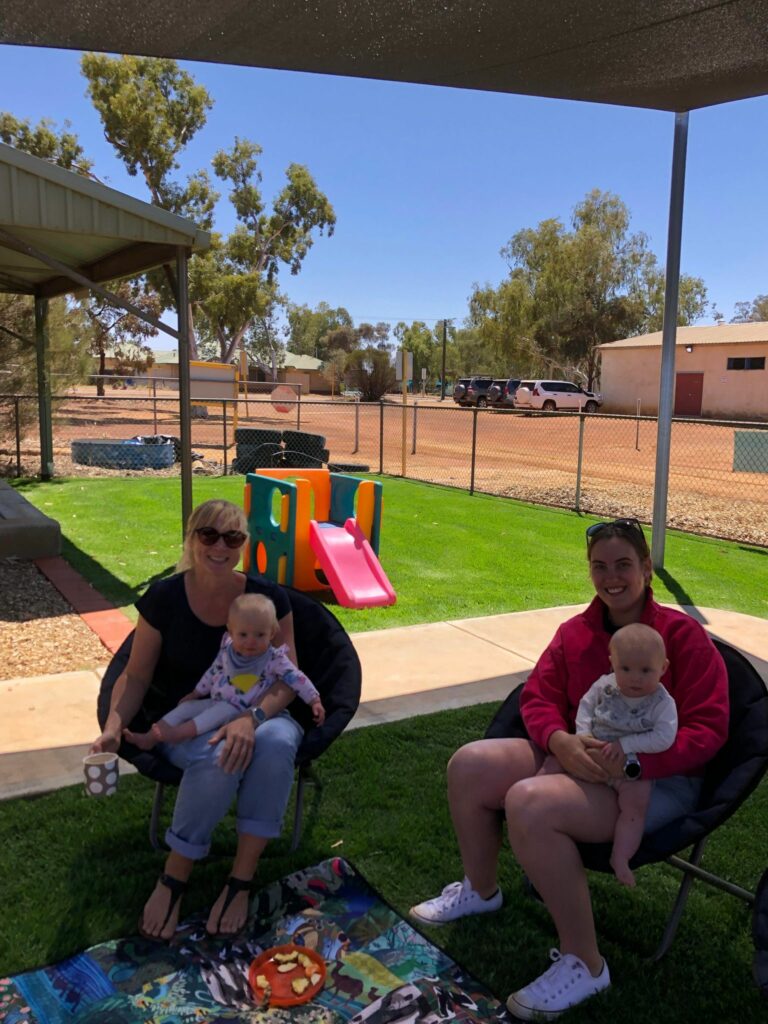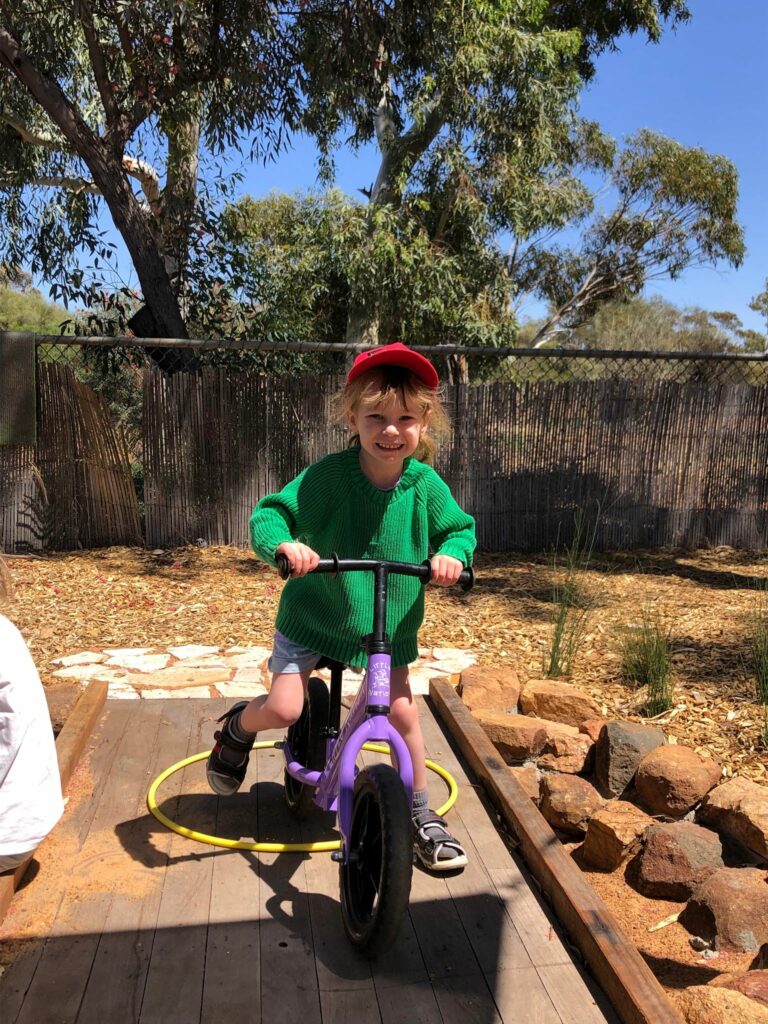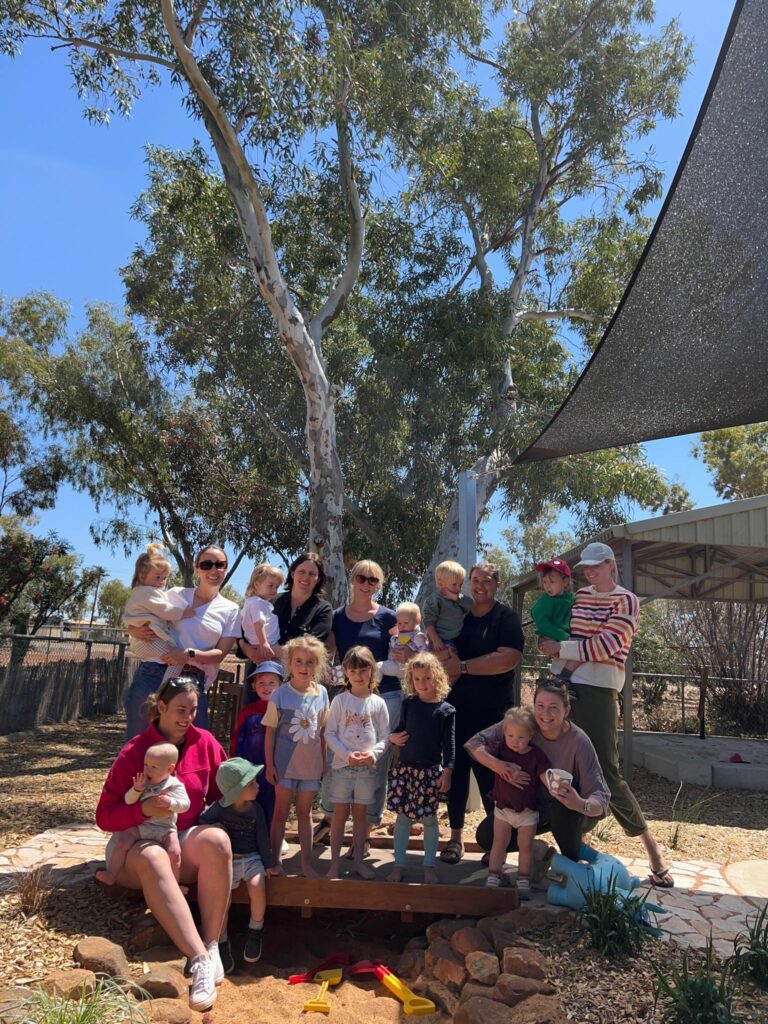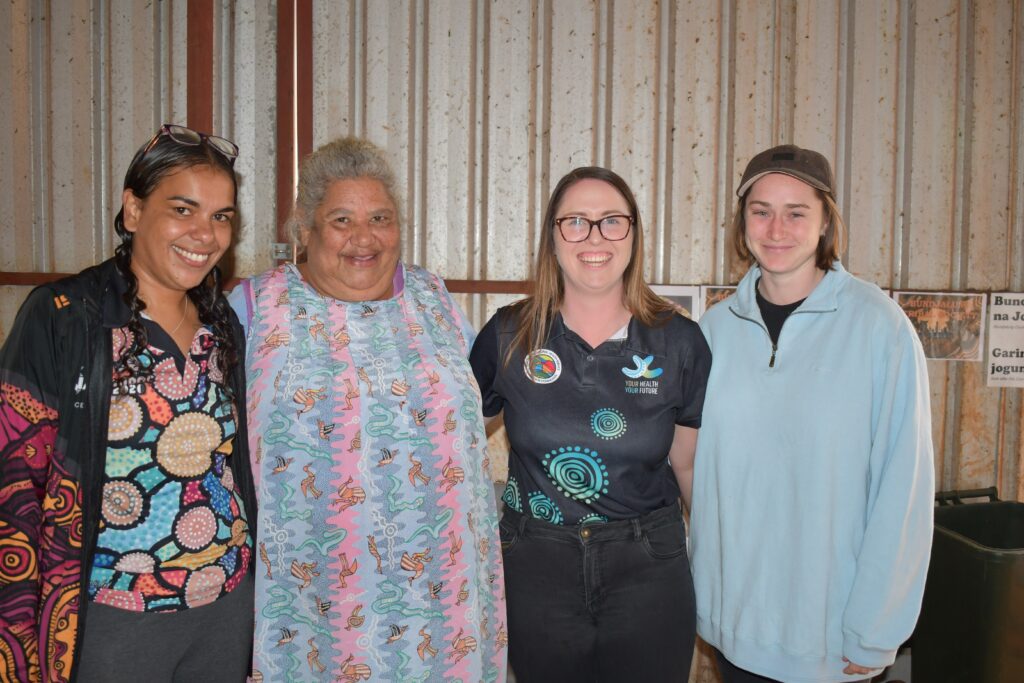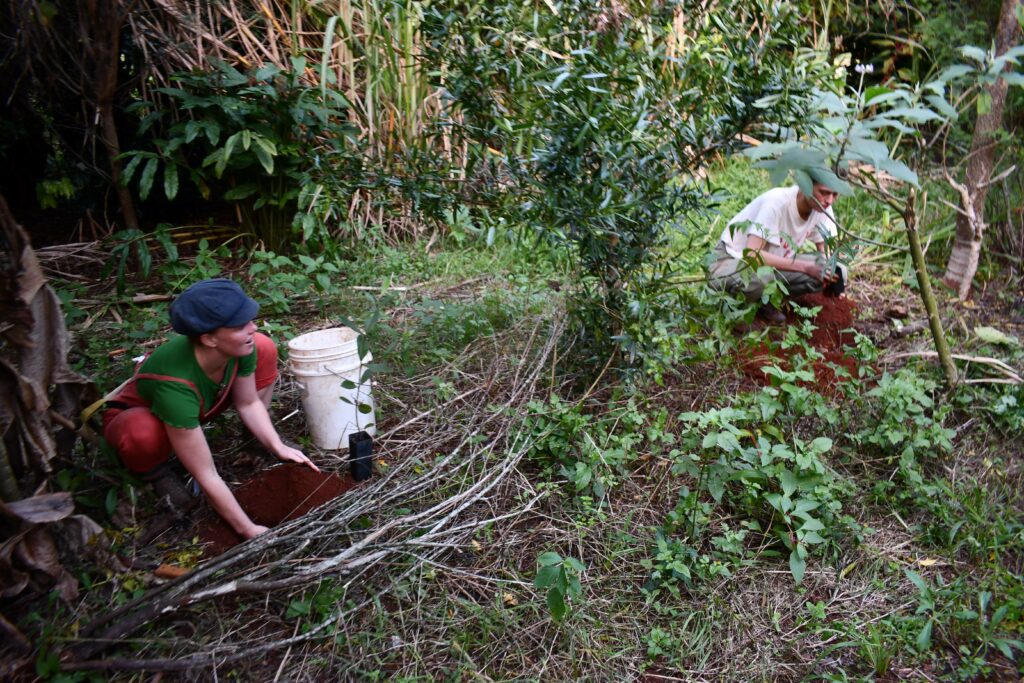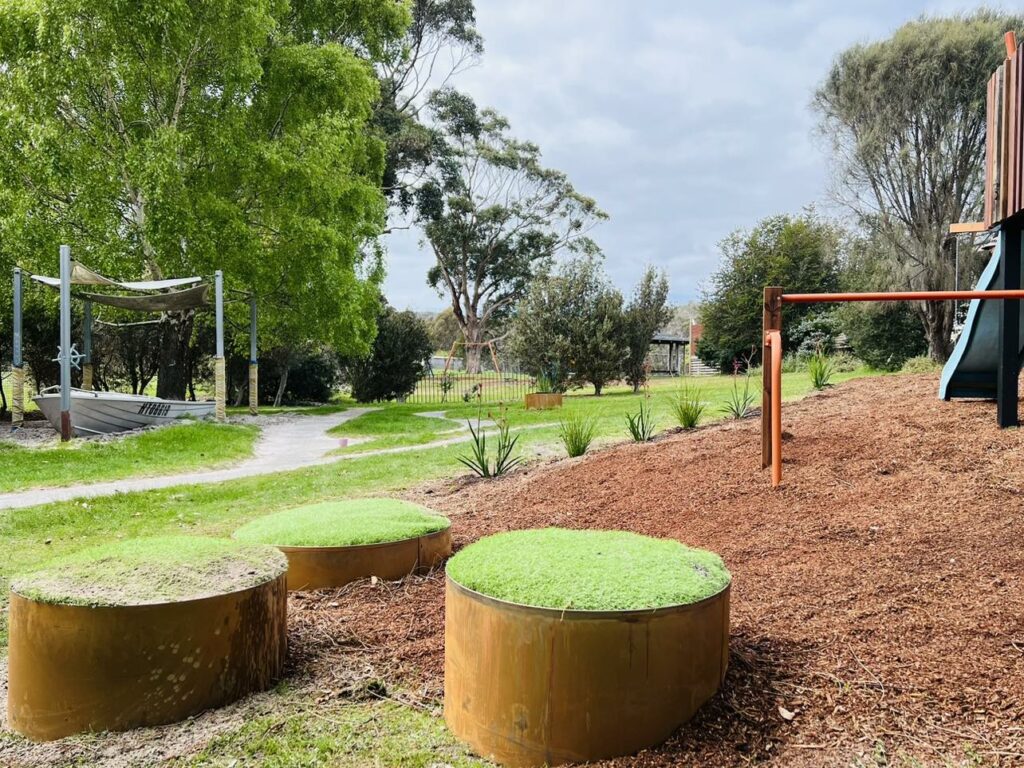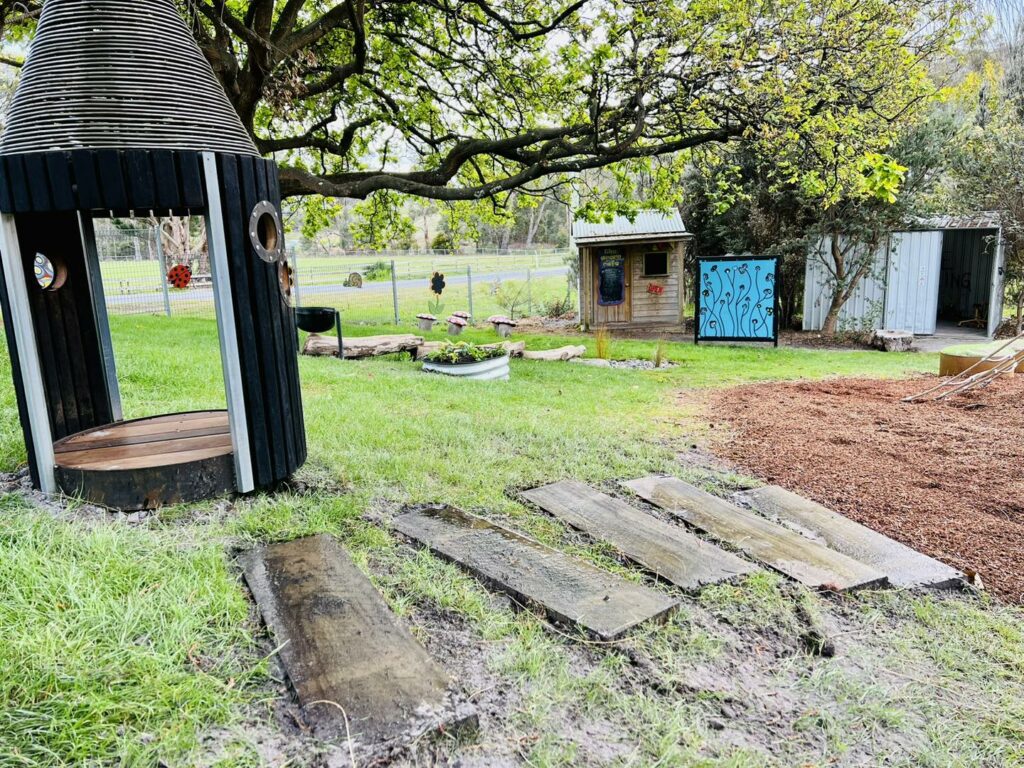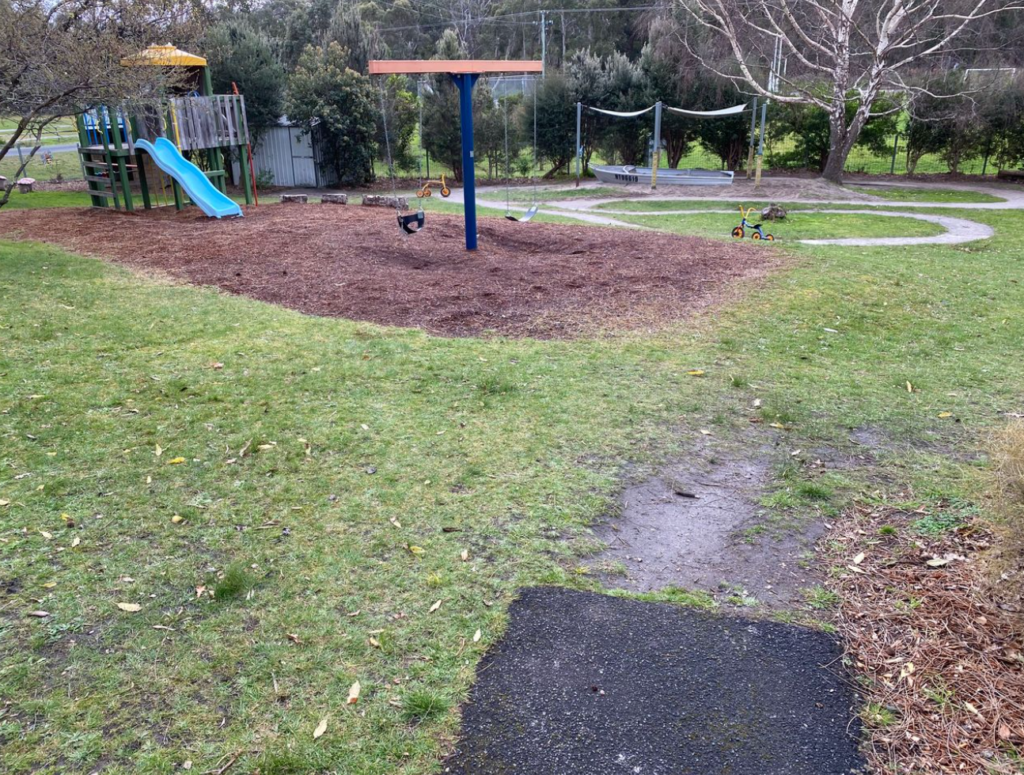Foundation for Rural & Regional Renewal (FRRR)
More flexible support needed to ensure sustainable, vibrant and empowered communities
FRRR is calling for individuals and organisations to help meet the unmet needs of remote, rural and regional communities, which continue to grow despite FRRR distributing a record $22.5 million in grants in 2023 financial year (FY23).
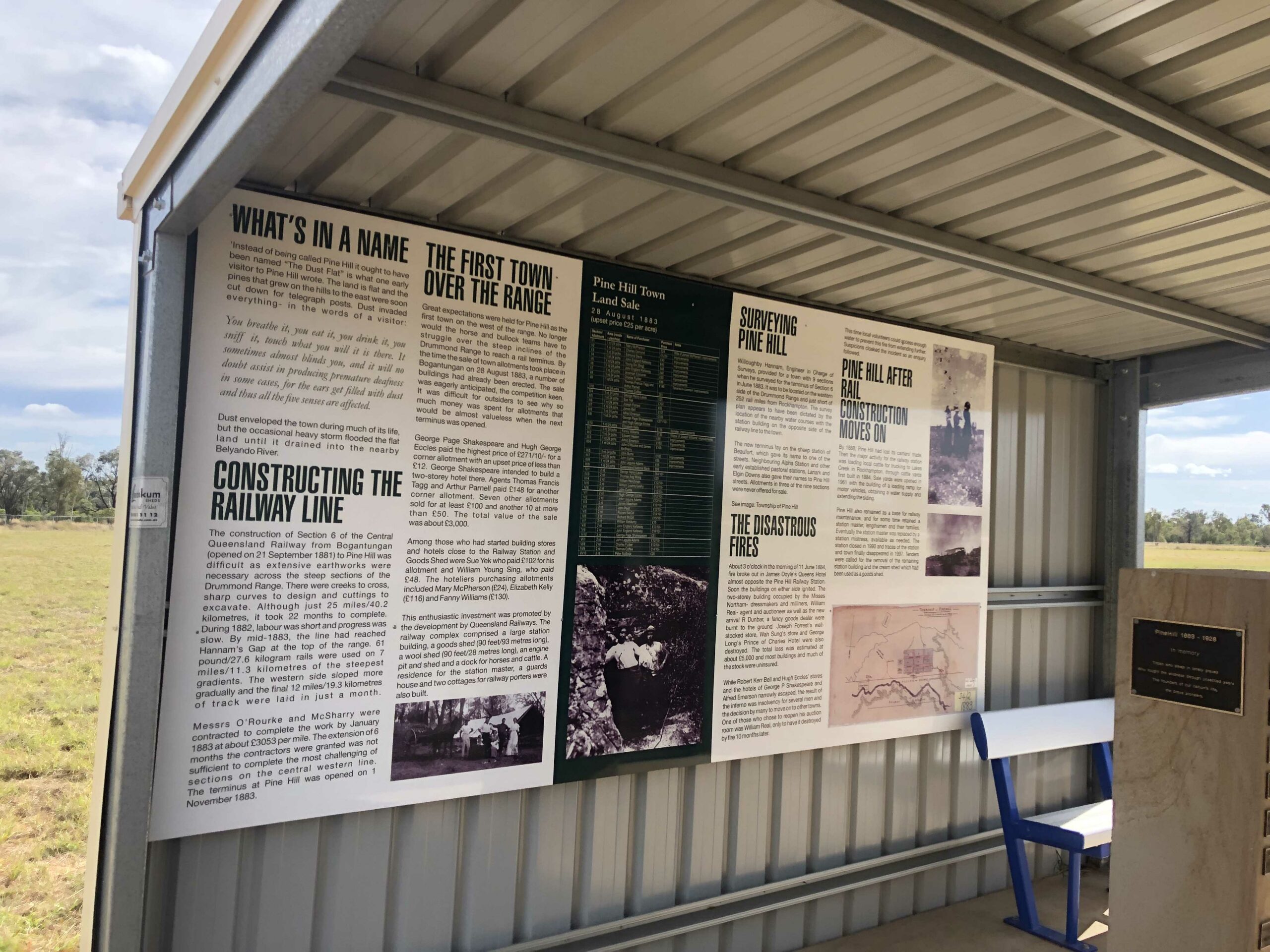
In FY23, FRRR’s flagship program, Strengthening Rural Communities, awarded more than $3.7 million via 466 small grants, valued at $10,000 or less, that directly benefited remote, rural and regional communities across Australia. The total value of those projects was more than $15.1 million, showing a remarkable leverage of a relatively small investment.
But this is only half the story. In FY23, for nearly every 10 projects that received a small grant, one missed out. In the last round of this program alone, there were 85 funding-ready projects that FRRR couldn’t support because it didn’t have enough money.
Natalie Egleton, FRRR’s CEO, says that FRRR’s small grants empower people in remote, rural and regional Australia to create communities that are vibrant and sustainable places to live and work, for the long-term.
“Rural people want to see their communities thrive. They want to be able to support those doing it tough or with special needs, like older residents; enhance community facilities to respond to the changing climate; provide access to music and cultural experiences for younger people; host events that bring a remote community together to celebrate what makes it unique or to recover after difficult times, just to name a few.
“But every small grants round we offer is oversubscribed, meaning with few alternative funding options, many community projects are left unfunded and critical needs are left unmet.
“It’s not just the dollars that are missed. Groups also say that FRRR’s funding has helped them to build capacity and confidence in their ability to test, learn and develop future other project ideas.
“Small grants help to bridge these gaps and make a lasting difference to remote, rural and regional Australia. By donating to FRRR, you help remote, rural and regional groups – many of whom can’t access funding elsewhere – to create vibrant, sustainable and empowered communities for the long-term,” Ms Egleton explains.
For example, previous small grant recipient, Alpha District Tourism & Development Association, in Queensland, explains, “FRRR has allowed us to achieve something that would have taken us years of fundraising for. Being a very small town fundraising is difficult due to the number of other small clubs and the small population. FRRR Grants are vital to help small communities.”
In Donald, Victoria, the St Arnaud Neighbourhood House used a small grant to improve social participation and the health and wellbeing of aged care residents, by getting local volunteers to record the resident’s life stories. Beyond the monetary value of the grant, the impact of this project was felt deeply throughout the community.
As the organisation shared with FRRR, “We believe this project created a community with a stronger social fabric, where young people were able to gain insights into the lives of those who came before them, and where the residents felt appreciated and respected, and that their life story was being honoured. We were most proud of the effect this project had upon the residents, many of whom were feeling isolated and forgotten. By demonstrating to them that they and their history still had meaning and importance, they felt a connection to the community and to the young people involved in the project.”
Meanwhile, in Morawa, Western Australia, the local playgroup was able to grow educational enrichment opportunities for 0-5 year olds by creating a shady nature play space. with the support of an FRRR small grant. In their project acquittal, Playgroup WA wrote that, “By completing this project it shows that despite being a small, low socio-economic town we can make life better for ourselves. We deserve nice facilities and can create them with the help of organisations like FRRR.”
It’s not just community groups that attest to the critical role of FRRR small grants. Natalie Devlin, Chief Experience Officer at Charter Hall, explains, “Having worked with FRRR since 2020, we have seen first-hand the difference they can make through their local understanding, and connection to grassroots organisations that often can’t access support otherwise.”
To enable FRRR to award more small grants, donate at: here. Contributions of $2 or more are tax deductible.
Find out more about the impact of small grants at: frrr.org.au/small-grants.
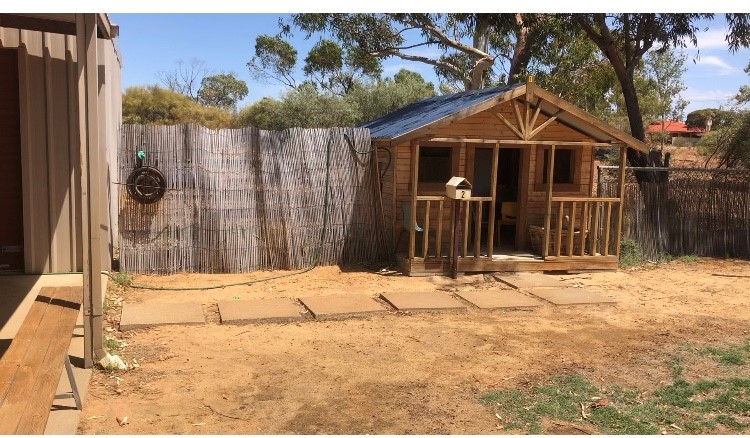 BEFORE
BEFORE
Morawa, a small town in Western Australia’s wheatbelt, lacks recreational and social opportunities for families with young children. With no cafes, the Morawa Playgroup, run for the last 40+ years, by mums (and the odd dad) serves as the primary gathering space for parents and caregivers seeking connection and support. However, Morawa Playgroup’s outdoor area was uninspiring, with a dying lawn and hard claypan soil.
Recognising the need for a vibrant outdoor space, the mums of Morawa Playgroup embarked on a project to transform their drab outdoor area into a nature playground. Collaborating with a local landscape designer, they developed a comprehensive plan to:
- Remove the old, inefficient irrigation system and replace it with a waterwise garden;
- Create a nature play space featuring sensory boxes, timber bridges, and a creek bed;
- Install shade sails to provide relief from the scorching sun and enhance the usability of the outdoor area;
- Establish seating areas for parents to connect and support each other while their children play.
The project unfolded over three years and received a boost from an FRRR grant of $9737, funded by Raine & Horne Foundation.
The completion of the project in September 2023 marked a significant milestone for Morawa Playgroup and the broader community. It’s now the only nature play space in the Shire, which spans 190km2, offering children and parents a welcoming and engaging environment. The shaded, waterwise garden has transformed the outdoor area, allowing children to play outdoors year-round and fostering a sense of connection among families.
Beyond the immediate benefits to the playgroup, the project’s impact extended to Morawa District High School, where reduced water bills freed up funds for educational resources. The positive effects of green spaces on mental wellbeing were evident at the opening of the new play space, signalling a brighter future for the community.
Despite the challenges of being a small, low socio-economic town, the project demonstrates the power of grassroots initiatives to improve quality of life. Morawa Playgroup’s success serves as a testament to the community’s resilience and determination to create a better future for its children and families.
Youngman Creek rehabilitation volunteer wellbeing program
The Namabunda property, situated in what was once the Big-Scrub subtropical rainforest covering over 75,000 Ha of the Northern Rivers, has degraded over the past 30 years – since its days as a lychee farm due to a lack of maintenance.
Bundjalung Tribal Society (BTS) is primarily a housing organisation providing social housing for the Aboriginal community in and around Lismore in northern NSW. They inherited the property and have spent many years, with volunteer support, trying to rehabilitate it to use for cultural activities and ecological preservation, planting bush tucker and medicines, running training and capacity building programs. Despite their efforts, setbacks like bushfires and the COVID pandemic have hindered progress. Community engagement, vital for sustaining the project, has waned due to volunteer fatigue and lockdown restrictions. BTS see the degradation of the Youngman Creek on the property as symbolic of the broader environmental and social challenges facing the community.
The group sought funding to help mobilise the community and resource them with support and infrastructure, expert training and capacity building to rehabilitate the Creek.
“By rehabilitating the creek, we rehabilitate ourselves and our community.”
With a grant of $9,997, supported by GlobalGiving, the group hosted a series of events at Namabunda which attracted significant community participation, including:
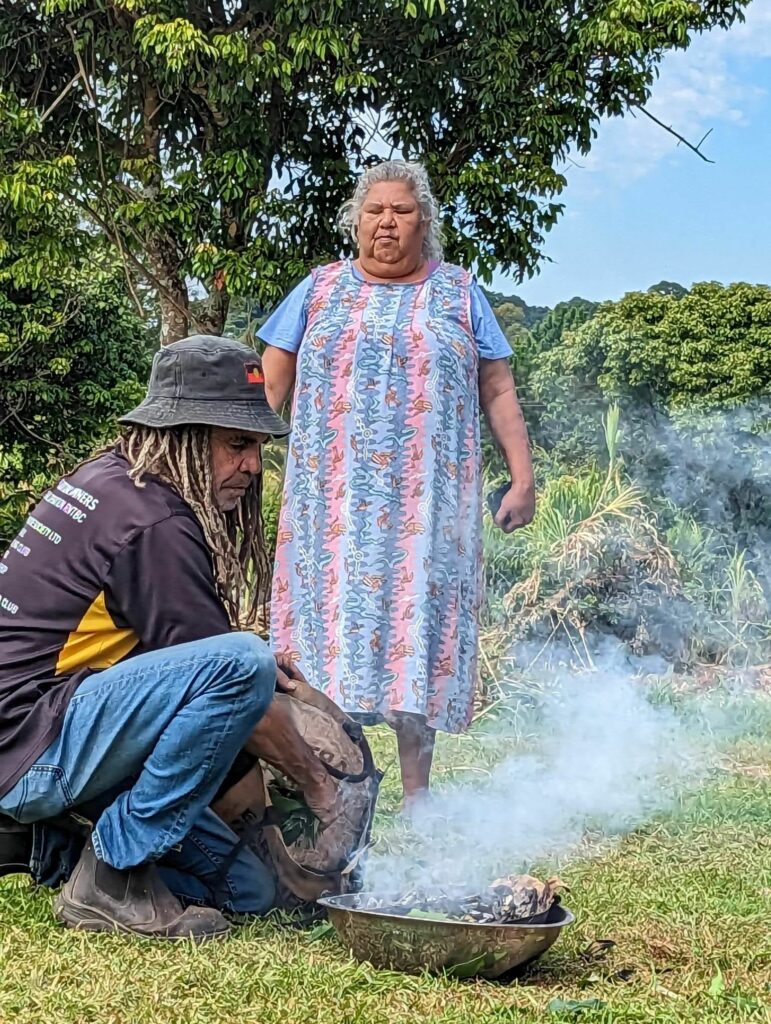
- Build community cohesion through shared activities and cultural workshops.
- Provide training in bush regeneration and ecosystem management for volunteers, especially in photographic monitoring of weed removal and tree planting;
- Offer wellbeing support and workshops led by qualified counselors to address the emotional toll of recent challenges.
- Deliver Bundjalung cultural and ecological knowledge workshops, installing didactic signs about the work to increase awareness and use of Bundjalung ecological knowledge and language, and explaining and demonstrating the value of a healthy waterway ecosystem to neighbouring landowners.
These events will integrate practical activities, such as weeding and planting, with educational sessions on assisted native regeneration techniques. A focus on the Youngman Creek watershed aligns with the project’s theme of “renewal” and underscores the interconnectedness of environmental and community resilience.
Moving forward, Namabunda serves as a model for holistic, community-driven land management that nurtures both people and the environment.
“The thing we are most proud of is the sense of belonging and identity that we have generated through this project in response to the fires, pandemic and then the floods. The thing that was most successful is the deeper engagement between Bundjalung people and non-Indigenous people. The connections that we have built up over the last 18 months is really beautiful to see”.
FRRR and Gardiner Foundation offer grants up to $5,000 to local not-for-profits
Community groups in small dairy communities across Gippsland, South-West and Northern Victoria can now apply for Gardiner Foundation Community Grants up to $5,000 to strengthen and build capacity in their dairying region.
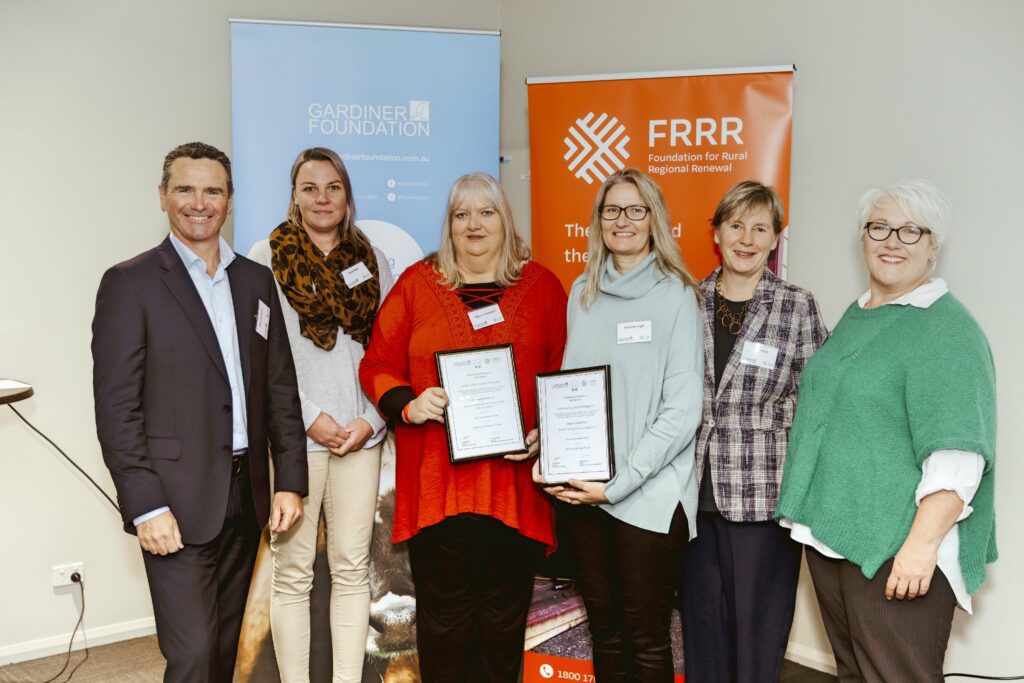
Over the last 22 years, FRRR and Gardiner Foundation have granted more than $2.2 million to 560 projects that have helped these farming communities to be more connected, sustainable, and vibrant places to live and work.
This year, the Gardiner Foundation Community Grants Program is offering grants totalling $120,000 to not-for-profit organisations (NFPs) for a broad range of projects that help their dairying communities to thrive.
Allan Cameron, Gardiner Foundation CEO, said that the Foundation is committed to continuing to invest in the local groups that are working to enhance the liveability of small Victorian towns reliant on the dairy industry.
“We know that year in, year out, community volunteers are committed to the work of local community groups which meet local challenges and create opportunities to strengthen the fabric of their communities.” Mr Cameron said.
Historically, the community grants have funded a diverse range of projects, including initiatives that support education and training, health and social wellbeing or the amenity of a public setting.
Last year’s Community Grants Program provides some examples of the range of initiatives that are funded. In Leongatha, the local Men’s Shed, which hosts a range of community groups, including the local choir, received funds for an air conditioner. In Gellibrand, the local Hall Committee received a grant to buy new chairs to improve the amenity and safety of the community’s meeting space. Warrnambool College and Grasmere Primary School received a grant to establish an Indigenous sensory garden, which has provided students with hands on experience to enhance their educational outcomes.
“I look forward to seeing the impact that is delivered from this year’s grants,” Mr Cameron said.
Natalie Egleton, CEO of FRRR, said it’s wonderful to have partners, like Gardiner Foundation, that understand the impact that small grants can have on rural places.
“We know from past recipients that these grants have enabled communities to achieve more than they would otherwise. Groups also tell us how it can often be a catalyst for further funding. This reaffirms the importance of this program, and it shows that with just a small amount of seed funding, communities can build resilience and thrive.
“I encourage community groups to take advantage of these grants and consider how they can leverage the funds, so that they have the capacity to inspire, engage and strengthen their dairy communities,” Ms Egleton said.
Applications for the Gardiner Foundation Community Grants Program close 21 March 2024 at 5 pm AEDT.
An online grantseeker workshop will be held Monday, 19 February 2024 from 2-3pm AEDT.
For more information about the grants, or to register for the grantseeker workshop, please visit the Gardiner Foundation Community Grants Program webpage.
In 2020 the Bruny Island District School Parents & Friends committee identified the need to upgrade the ‘Billabong Playground’, which caters for children up to five and their families.
Working with a local landscaper, the plan was to retain the swings, cubby house, bike path and sandpit and add an above ground timber tunnel with climbing grips over it, a small princess castle and artificial grass covered seats/jumping pods. They also intended to create a safe water play area incorporating a cauldron that fills with water and can be released via a plug. This flows into a wetland area beyond the playground fence. All this would be surrounded by plants and surfaces that stimulate sensory play.
While there were some changes along the way, the main installation and repair took place in early October 2022 and was ready for use mid-October. The work was undertaken by a local contractor, with volunteers adding plants and the artificial grass seats, as well as some timber sleeper steps in mid-October 2022.
The project was supported by a $10,000 SRC grant, thanks to the support of the Bertalli Family Foundation. However, local businesses were also asked to contribute to the project, which meant they could also install a timber shelter. The Playground is now fully functional with the 65+ students from the school and wider community being able to access it.
But the project resulted in far more than just a great play space for the children. It has strengthened the connections between the school and local businesses and the community more broadly. Additionally, the project gave a small group of volunteers the confidence to know that they can achieve great outcomes to improve their community. They displayed courage and aspiration, values that have been included in Bruny School’s values and it’s fantastic for the students to see the results they can bring, not only individuals but the entire community and future generations.
By Jeanice Henderson, In a Good Place Program Coordinator
Despite the many positive aspects of living in remote, rural, and regional communities, there are also distinct challenges associated with distance and isolation, which place these communities at greater risk of poorer mental health outcomes.
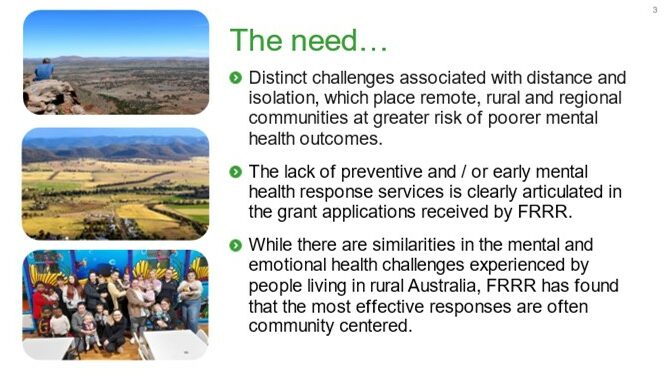
These include:
- Lack of available service or long wait times;
- Poor, interrupted or lack of digital services and access;
- Reduction in volunteers, business closures, job losses, loss of agricultural markets;
- Poorer outcomes in the social determinants of health;
- Life on the land can be hard – drought, fire, flood, mouse plague, cyclones; and
- Stigma, shame, and ‘stiff upper lip’ attitudes to mental health.
The compounding and accumulative effects of some or all of these things take their toll – on individuals, families and the communities they live in.
Local solutions need support
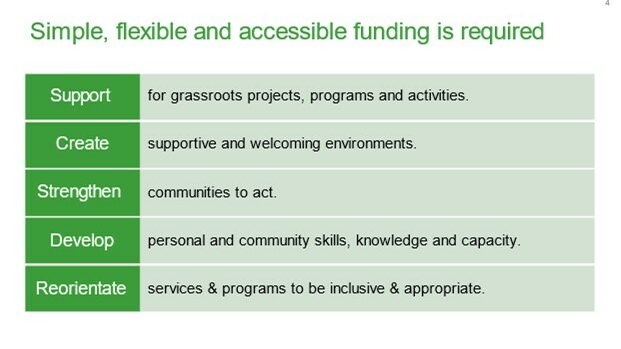
At FRRR, we have found that the most effective responses to these challenges are often community centered but lack access or visibility to government or philanthropic funding.
Simple, flexible and accessible funding is required to support projects, programs and activities that create supportive environments, strengthen communities to act, develop personal skills and support services to re-orientate their programs to be both inclusive and appropriate for all.
This is where philanthropy can play an important enabling role, especially for grassroots organisations that often can’t access traditional philanthropy.
Small grants can be the straightforward and friendly ‘front door’ through which grassroots organisations can step to build their capability, connect their community and navigate and drive change.
In fact, for many communities experiencing disadvantage, small grants are one of the few ways that they can get the resources and opportunities to launch new ideas or approaches in their communities.
While not always ‘sexy’, the projects and the needs met through these grants, can address areas of disadvantage and inequity in communities that often have little visibility to funders and policymakers.
We’ve seen this be particularly effective when those small grants are targeted toward addressing specific needs. A case in point is in the area of mental health.
In A Good Place
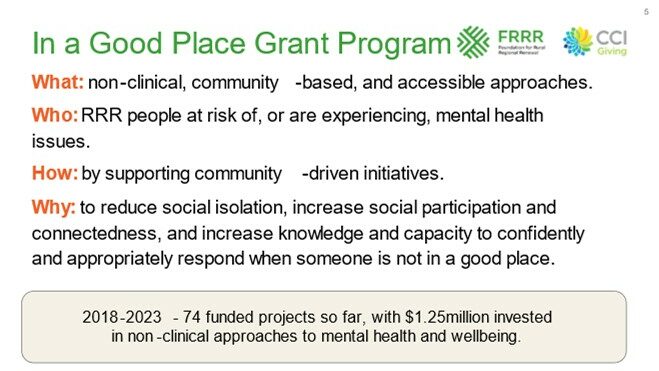
In a Good Place is a national philanthropic grant program, delivered by FRRR and funded in partnership with CCI Giving.
This aim is to support people living in remote, rural and regional communities seeking help who are at risk of, or are experiencing, mental health issues.
The program has a relatively small, flexible funding pool of $250,000 per year, and offers grants of up to $20,000 to enable rural communities to action their ideas and solutions.
Our focus is to support efforts to strengthen the mental health of at-risk or vulnerable people via services or activities that are preventative or responsive in nature and designed to engage those less likely or unable to participate in mental, social and emotional wellbeing activities.
This program truly reflects the FRRR ethos that local communities are best placed to identify local needs, local opportunities and lead local responses.
We have run the program since 2018 and have so far funded 84 projects – that’s $1.25 million in small grants invested into remote, rural and regional communities to support non-clinical approaches to mental health and wellbeing.
We’re very proud of it, but it’s really a drop in the ocean, as demand for this kind of support is very strong – and only increasing. Between 2018 and 2023, 397 applications requested over $6,443,348 in grant funding for combined total project cost of $18,981,059.
Further, 24.8% of these were first time applicants to FRRR, as this is one of the few programs of its type. And, in reality, they are not seeking very much funding – the average request was $16,230.
Of the successful applications:
- The smallest grant was $2,970.
- The average grant was $14,935.80.
- 23.8% were awarded the full grant amount ($20,000).
- Our $1.25 million support projects valued at over $4.5 million.
- Local communities are still putting in a lot – the estimated value of in-kind support for funded projects is $1,126,082.
Every dollar granted by the In a Good Place program was matched by an additional $2.61 in other funding or in -kind support.
Demand is high
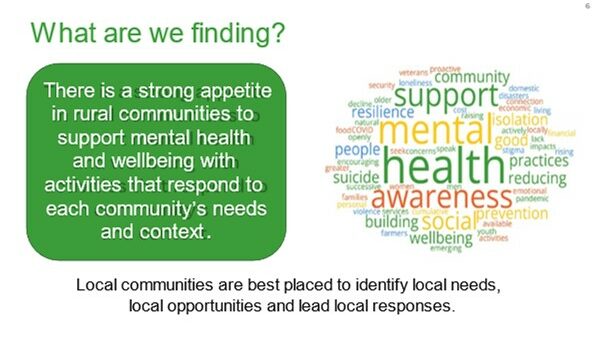
Since the program opened, more than 400 organisations have applied, requesting nearly $6.5 million towards projects with a combined value of over $19 million.
Remember, these are for relatively small grants – up to $20,000 – so it’s clear that there is a strong appetite out there to support community mental health and wellbeing.
Who benefits
So, just who is applying for these grants?
The short answer is grassroots community groups. FRRR doesn’t require applicants to have any special status, such as DRG1. This means we receive applications from community groups that are working directly with community members, families, young people, older people, veterans, gender specific focus groups, mental health and suicide awareness groups, community houses and school councils.
The word cloud above comes directly from the themes listed in this year’s In a Good Place applications. While there are different ideas that appear each round, there are some consistent themes and project approaches each round, including:
- Suicide prevention.
- Capacity building such as Mental Health First Aid training.
- Alleviating loneliness and isolation.
- Projects focused on the mental health of specific cohorts – men, youth, aged, students, families, farmers, culturally and linguistically diverse (CALD) communities.
- Community gardens / horticulture, animal therapy, art therapy nutrition and exercise as integral parts of overall mental health and wellbeing programs.
- Mental health and wellbeing awareness activities.
- Events that bring people together, connect with each other.
- Responding to the impacts of cumulative economic, social and emotional impacts of successive natural disasters and COVID.
Emerging themes of late have included:
- Community based support programs for ADF Veterans / First Responders.
- Supporting those affected by domestic violence.
- Responding to social determinants of mental health, such as food security, housing security / homelessness, disability and under / insecure employment.
- Increased recognition and use of lived experience and peer volunteers.
Proven impacts
There are many stories that we could share about the impacts of these grants and how they have contributed to building healthier, resilient and better-connected communities by supporting and promoting mental health awareness, and building individual and community resilience.
I’m Not Afraid To Talk
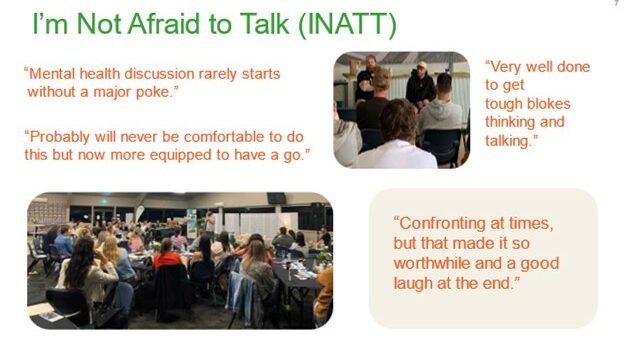
For example – University of South Australia partnered with a community group called I’m Not Afraid to Talk to pilot and evaluate a Men’s Mental Health program. It sought to challenge the stigma surrounding mental health – by doing so in an environment that is very familiar to local men and adolescents – the football club. The aim was to improve mental health and reduce the risk of suicide by providing a safe and informed environment in which to connect with others and normalise self-help seeking.
Working around COVID restrictions, cancellation of the football season, harvesting and extreme weather events, the workshops were held in Kimba, Tumby Bay and Cowell in SA.
Each four-hour workshop featured local speakers who shared their experienced, which was followed by a series of activities that focused on how men may be perceived by others and how they perceive themselves, shared experiences and the importance of ongoing open conversations about mental health.
Comments received after the football club presentations were interesting, but we particularly liked the insight from one man – “mental health discussion rarely starts without a major poke.:
Subsequently, a toolkit was developed by UniSA and INATT to guide the footy clubs in continuing the mental health conversation. The steps and strategies listed in the resource were based on community development principles.
INATT ran an additional workshop for women. This was extremely popular, with more than 80 women attending from Kimba and surrounding communities.
The project leveraged the extremely strong links INATT has with the Greater Flinders and Eastern Eyre communities, which was evident by their excellent leadership and facilitation of the workshops and high attendance, and the expertise of Uni SA in capturing the insights from each workshop and developing the community tool kits for clubs to use.
Melodies, Mates and Mental Health
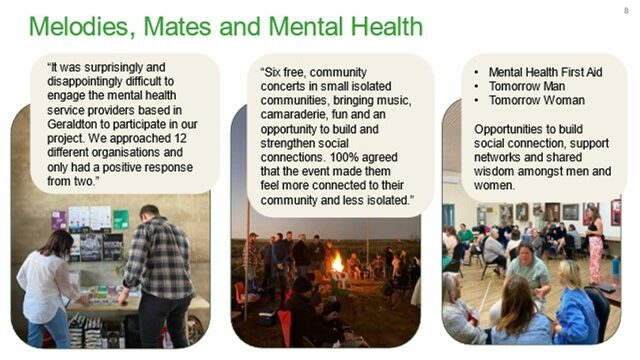
In another example, Mullewa is a small agricultural community in WA, which experiences the challenges of rural isolation, declining population, long distances and dependence on the weather for economic success in farming and tourism. These challenges were putting many at risk of poor physical and mental health, exacerbated by the consequences of COVID which saw events cancelled that traditionally brought people together and sustained strong social connections.
The Mullewa Community Resource Centre used their grant to deliver six free, community concerts in the smaller remote locations in the district. Each event brought people together for a BBQ, music and an interval during which there was a presentation regarding mental health. There was always a collection of resources that people could take home. They also conducted events in Mullewa at the end of the year and at the Mullewa Agricultural Show, which not only attracted the locals but visitors who were in town.
To really drive home the mental health message and develop the skills and capacity of the locals, the Resource Centre engaged a facilitator to run a Mental Health First Aid course. While only nine people attended, it actually meant that one additional skilled person was now available for every 50 adults in their community.
With the remaining funds, they engaged professionals to facilitate “Gather with the Women of Mullewa” and “A Night with the Blokes of Mullewa”, with both workshops focused on open, honest communication about how you are feeling with loved ones, family or friends.
Overall, they estimate about 500 people participated, sometimes more than once. The music events brought people together and built shared memories, while the training events built vital skills and networks and the confidence to use them when needed.
Creating a Safe Space
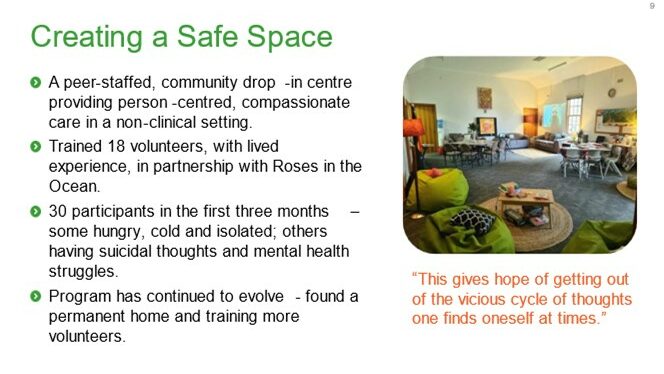
Another great example is local suicide prevention group, Every Life Matters (ELM), who teamed up with the Castlemaine Neighbourhood House to establish the Castlemaine Safe Space. It has become an inclusive venue for people to connect with others when feeling vulnerable.
Working with the local health services, ELM identified when there were local spikes in calls for assistance and pinpointed two evenings per week where there seemed to be a greatest need and aimed to operate over those times.
While the challenge was on to find a suitable location, the group worked with Roses in the Ocean and Living Works to develop a training schedule to support lived experience volunteers to work at the Safe Space during opening times. The In a Good Place program provided seed funding to support the training and purchase some basic equipment for the space.
Eighteen peer volunteers were trained in the first instance, and the centre welcomed more than 30 people through the doors in the first three months. Interestingly, most of them were male.
The Safe Space is now an independent group and has found a more permanent home. They have received additional funding to train more volunteers with lived experience to enable extended opening times and guard against fatigue, and to increase the visibility of the space in the local community. They have also gained funding support from the local Council. This is an innovative project and one that we watch with interest as it develops and progresses.
Small grants, big impact
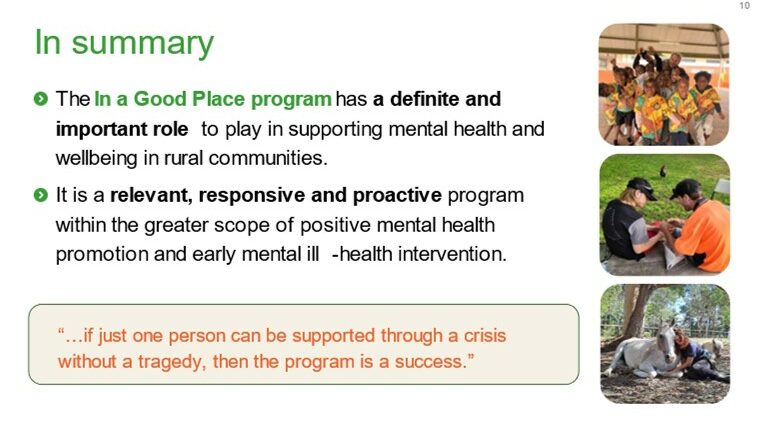
The In a Good Place program – and targeted small grants more generally, have a definite and important role to play in supporting rural communities to activate their ideas and solutions.
Analysis of final reports confirm that at a community level, the program has increased the knowledge and understanding of mental health issues in those rural communities, and helped to reduce stigma for those experiencing mental health challenges.
It is a relevant, responsive and proactive program within the greater scope of positive mental health promotion and early mental ill-health intervention.
We acknowledge that it is a relatively small contribution. But the communities we work with tell us they are forever grateful that the funds were available to support them.
One grantee sums this up perfectly, “If just one person can be supported through a crisis without a tragedy, then the program is a success.”
If you’d like to add your support to these kinds of impactful community-led projects, please contact our partnerships team.
By Jill Karena, Place Portfolio Lead
Philanthropy invests significantly in communities by making grants right across Australia. In FRRR’s case, we are focused on supporting remote, rural and regional communities, especially grassroots organisations that often can’t access traditional philanthropy. However, there is no one-size-fits-all solution, which is why we offer a range of programs – some where we work deeply over multiple years through place-based initiatives to build the capacity of a group of local not for profits, and others where we work broadly through our small grants programs – offering up to $25,000, although most are around $10,000.
These small grants programs are our most in-demand which are well suited to co-funding approaches that enable collective contributions to achieve more together and create leverage for funders and communities. While not always ‘sexy’, the needs met through these grants address areas of disadvantage and basic quality of life in communities with little visibility to funders and policymakers. They range from upgrading toilets and kitchens, which improves accessibility of community facilities, to installing air-conditioners to manage climate extremes, and seed funding new ideas to stimulate new approaches to volunteering, health services, and disaster preparedness. Moreover, their value goes far beyond the dollars themselves. From more than 20 years of experience, we can safely say that in the case of many grassroots community groups, small is good.
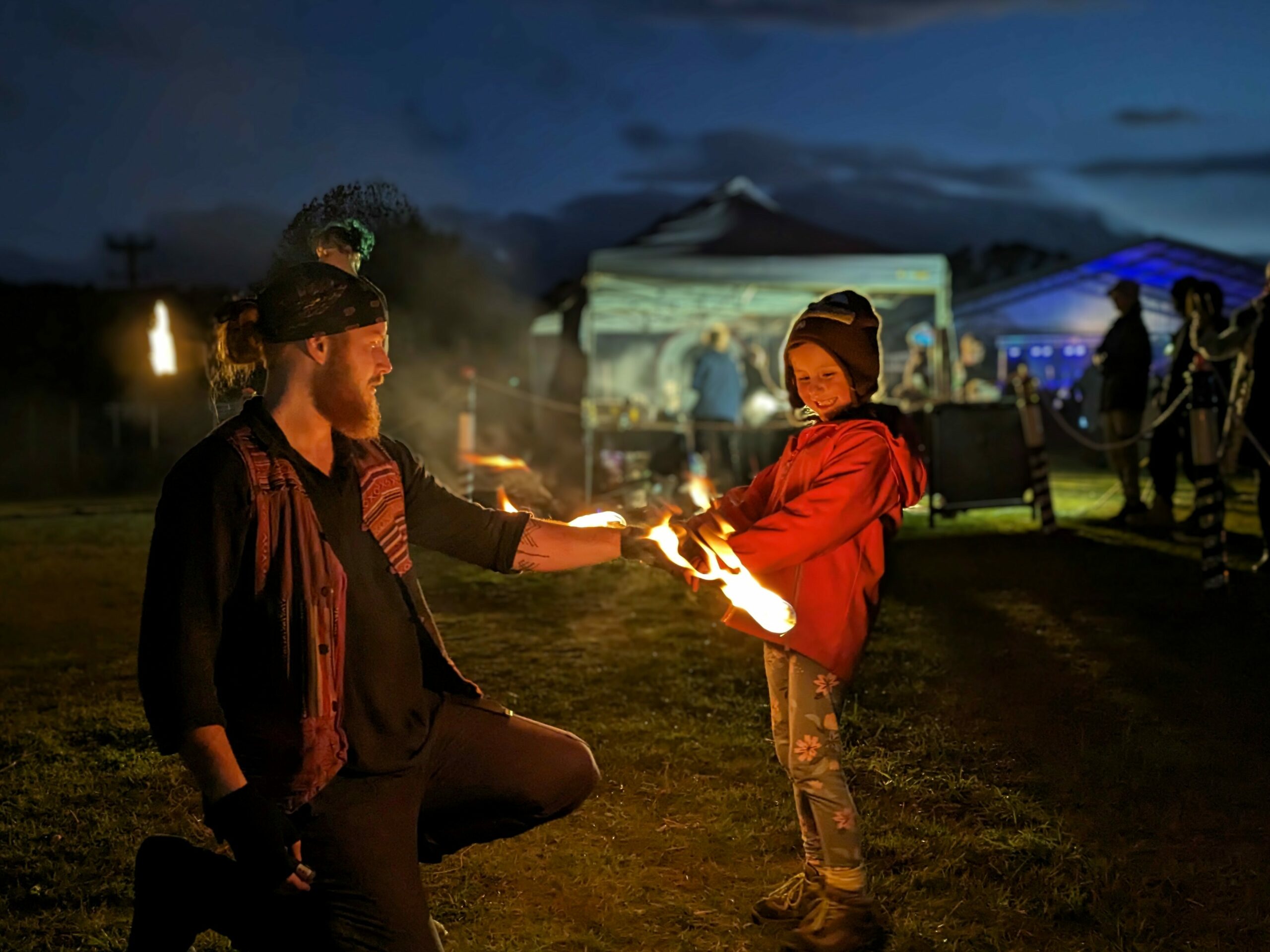
Small grants, big impact
By their very nature, small grants are simpler to navigate and have lower barriers to entry, making them more appealing to a wider range of organisations. Some grant programs, like FRRR’s Strengthening Rural Communities, also offer expert support by phone or email, making the process even easier.
Small grants can be the straightforward and friendly ‘front door’ through which grassroots organisations can step to build their capability, connect their community and navigate and drive change. In fact, for many communities experiencing disadvantage, small grants are one of the few ways that they can get the resources and opportunities to launch new ideas or approaches in their communities. And they deliver far more than just money.
Dipping a toe in, learning as they go
For communities that have not applied for funding before, small grants build their experience and confidence in developing project ideas, applying for funding, project management, budgeting and meeting reporting requirements. In the last 12 months, more than a third of Strengthening Rural Communities grant applicants (503 organisations) were first time applicants. Even if they aren’t successful the first time around, constructive feedback, such as the detailed information we always offer to unsuccessful applicants, can give them the confidence to apply again.
Biting off just what they can chew
Many communities are great at developing a long-term vision for their community that might focus on local services, economic development, environmental sustainability or climate change adaption but much as they’d like to do so, it’s simply not possible to achieve everything at once. Small grants enable a community to tackle making those big changes one project at a time. This supports them to make incremental progress against their long-term goals, while the lower scrutiny and risk associated with a small amount of funding can be less anxiety-inducing for organisations who are new to grant seeking.
Attracting more funding
Securing their first small grant is a pivotal moment for an organisation. It’s not just about funding support – it is also a recognition of the value of an organisation’s work and its ability to contribute to their community’s future. Once they’ve been successful, it’s often a catalyst for aiming higher and developing self-belief and self-reliance to create positive change in their community.
Demonstrating that they can successfully manage their first small grant and deliver tangible results builds an organisation’s credibility and can help open the door to securing larger grants to scale-up their project or take on a more ambitious idea. Often, it’s also the vote of confidence that other donors need to see to also come in and support the group’s work.
Getting to work sooner
Small grants usually have shorter application and approval timelines and offer more flexibility to enable communities to tailor projects to meet local priorities and needs, or quickly respond to unexpected disasters and other shocks. Smaller grants also usually come with fewer restrictions and reporting requirements compared to larger grants, which can often make it easier to negotiate with the funder to adapt their project if conditions change.
Finding and piloting local solutions
The flexibility of small grants also encourages communities to experiment with local problem solving, potentially sparking new approaches that are scalable or portable to other communities. Often small grants are seed funding to pilot locally generated or adopted ideas that are not of interest to larger grant programs. Using small grant funding to demonstrate the viability of a community idea can generate the evidence needed to secure larger grants or other support to bring the idea to reality.
“Thank you so much for providing the funds for this grant. This renovation has given Council initiative to support the Toy Library by maintaining the building so we can provide an inviting space and nurturing space for the community. The Toy Library has had many, many years of dedication by passionate volunteers to support and nurture the children of Tamworth and I think it deserves it!
When I started as president the library looked awful and didn’t reflect the commitment, love and pride that our small but dedicated group deserved. Now I feel like our space reflects our organisation. An important community organisation that cares and values the children, parents and carers of Tamworth and feels that learning through play is core to a child’s life and development! Another positive change is that the renovations have been a catalyst for council to complete much needed (and much requested) maintenance on the building by fixing gutters, replacing doors and cracked tiles and replacing the old sink and toilet.”
Tamworth Toy Library Incorporated
Connecting the Community
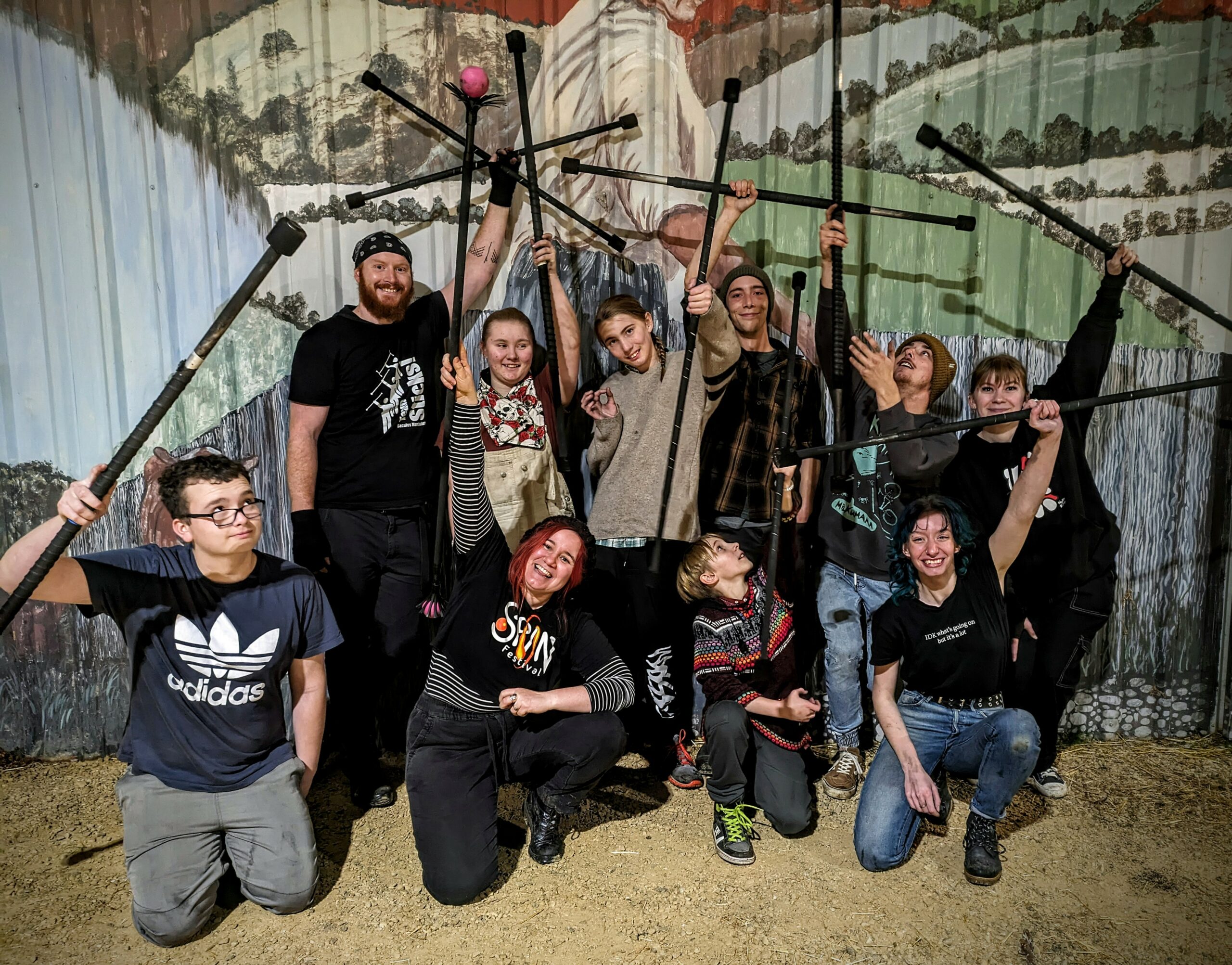
Small grants also offer a reason for different groups in the community to work together to develop and deliver projects that are meaningful and manageable. When community members, other community organisations and Local Government see the results from a small grant project that makes their community better, it is a great morale booster, and they are more likely to be motivated to get involved in future community initiatives.
“The event’s success lies in its ability to bring the community together, boost the local economy, and celebrate cultural heritage. The event provided a platform for residents to come together after the floods, share their experiences, and rebuild social connections. Through artistic workshops, events, and exhibitions, community members bonded over shared creative experiences, fostering unity and a sense of belonging.”
Arts Deloraine – festival / youth workshops (flood recovery)
Building local capacity
It’s not just the mere fact of offering smaller-value grants that makes an impact. It’s what those grants fund that also helps to build local capacity, especially in small communities or where a new group has formed. For example, many of the grants FRRR funds are about helping groups build their own capacity – whether that’s the likes of governance training or strategic planning support.
“The grant received for strategic planning has paid for itself many times over. We had members who had ideas in their head but didn’t know how to plan or implement them. Since receiving the grant, we’ve been able to increase attendance of our market to over 5000 visitors in November 2021! We’ve also been able to provide free stalls to local community groups to increase their outreach. This also has a flow on effect to small businesses in the town. The pub is booked out for lunch, little local businesses thrive due to the amazing success of the market.”
Rotary Club of Kinglake Ranges
Bigger is not always better

Often, we hear suggestions that larger grants are better – but the reality is that many of the most deserving groups in the smallest and most remote locations simply will not – or indeed simply are not able to – apply for many of those grant opportunities.
While it’s great to see larger grants made available to communities, especially through Government programs, it is critical that we not lose sight of how important small grants are in strengthening capability and capacity in remote, rural and regional communities. Small communities, as you might guess, are, well… small! This can make it hard to compete with larger communities, especially when it comes to demonstrating measures of impact which funders often ask for – small communities can’t point to economies of scale or large numbers of beneficiaries.
With fewer people to draw on, volunteers are often stretched and there are less likely to be paid resources or an experienced grant writer to chase high-value grants or manage large-scale projects. Groups often won’t apply because they don’t have the capacity to meet the reporting requirements or to manage the other governance expectations, such as the frequency of reporting or detailed probity plans. Even the prospect of managing large sums of money can be scary for a first-time grant applicant and some small communities can find it simply overwhelming!
What makes small grants so impactful in rural and remote Australia is their flexibility and relative simplicity, which means they’re more accessible and attractive to those communities that don’t have the resources to wrestle with the complexities of large grants. So we urge all those who are working so hard to grow the funds that are directed via the social sector to make sure that small grants continue to be a key stream of funding. If you’re funding large grants, consider coupling that with some smaller grant funding as well – they may well become organisations you’re able to fund in the future. Or, if you’re funding with a very tight focus, consider how small grants with more flexibility may bring unexpected pathways to that impact. Of course, we always welcome more partners for our collaboratively-funded Strengthening Rural Communities program, so get in touch if you’d like to know more.
Additional $150,000 per year going into canola-growing areas to support sustainability initiatives
FRRR has welcomed a three-year commitment from canola seed business, Nuseed, to support its flagship small grants program, Strengthening Rural Communities.
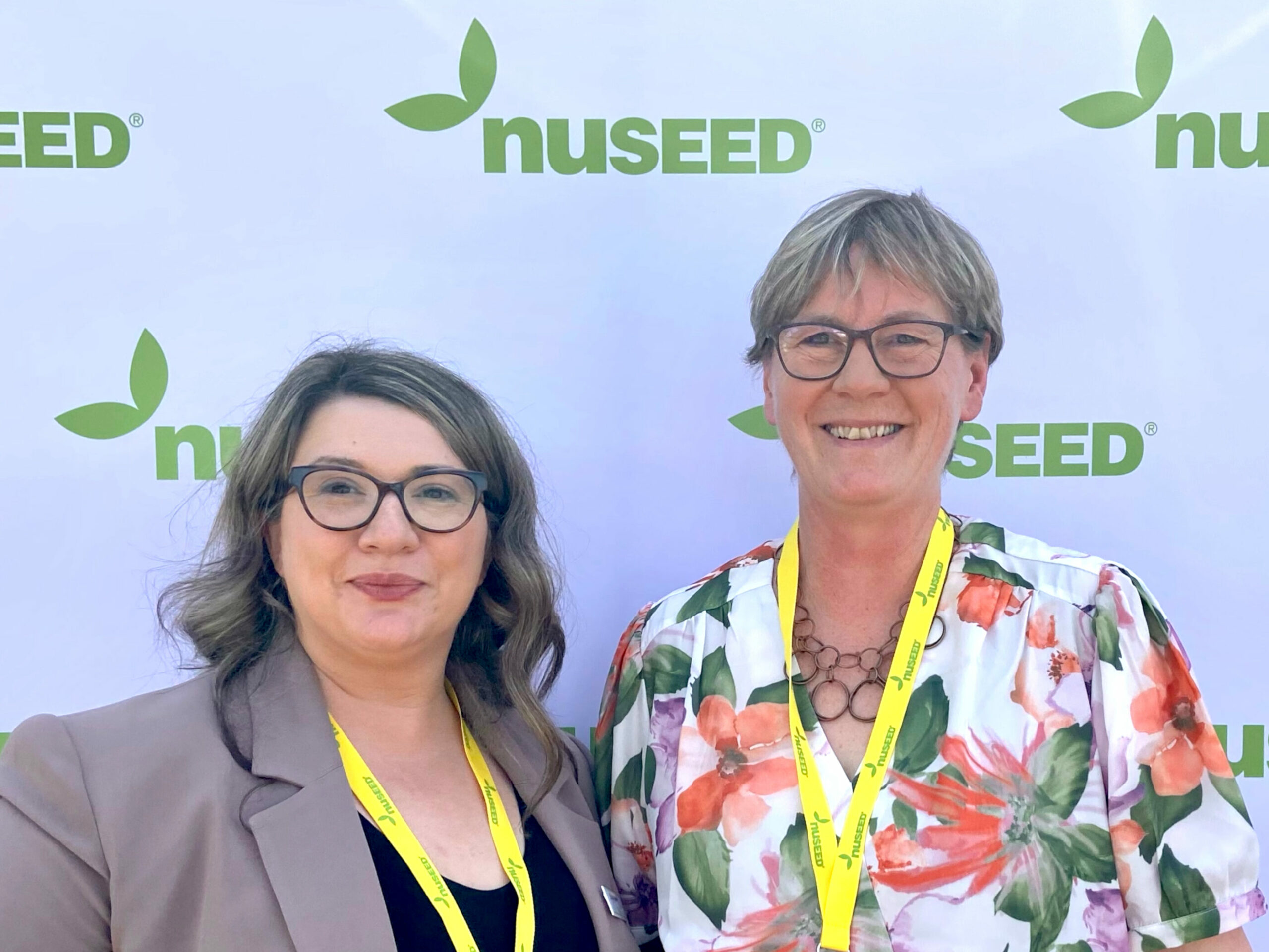
Announced at an event in Horsham on Wednesday 11 October, Nuseed Australia GM, Rachel Palumbo, said that with deep roots in rural communities, they wanted to give back to causes and organisations that are important to the farmers who invest in their seed, particularly around sustainability initiatives.
Ms Palumbo said, “Our team works hard to develop high-performing canola varieties for Australian farmers, and we know that we are successful because of the support we get in the local communities in which we operate. By partnering with FRRR we can support canola-growing communities in a tangible and significant way. The majority of our Nuseed team are also based in communities just like these, and see the benefits that community-focused projects can bring.”
“Nuseed is delighted to be adding our name to the list of organisations that are partnering with FRRR to ensure that funds get to the projects that really need support. Our funding will be directed at projects in canola-growing areas across the country that focus on sustainability related initiatives, in line with our strategic intent to provide plant-based solutions to some of food and fuel challenges we’re facing.”
Jill Karena, FRRR’s Place Programs Portfolio Lead, said the $150,000 annual donation will mean that many more community groups can invest in projects that they know will make a difference to the liveability and vitality of their communities.
“We are seeing more and more requests from community groups to help them respond to their changing needs, so it’s wonderful to be able to have dedicated funding available in canola-growing areas to be able to support these great projects.
“In some communities, that might look like installing air-conditioning in community owned buildings to reduce energy costs, providing sustainability focused education, undertaking tree planting, or waterway restoration initiatives. For other communities, it could be that the priority is to have a backup generator, solar panels or water tanks to ensure community gardens can be maintained.
“That’s the value of small grants programs like Strengthening Rural Communities. They are flexible and allow communities to get the funding to support the projects they prioritise, so we are really grateful for Nuseed’s support of this program. Our partnership will also mean that community groups get access to advice and support that builds their confidence and enables them to lodge a great application. We look forward to awarding many more grants thanks to their contribution,” Ms Karena said.
The Nuseed funding will be included in the next round of SRC, which is open now and will be announced by late February 2024. Community groups can already apply for SRC support, as this program is always open, with quarterly assessments. The program offers grants up to $10,000 through the Small and Vital stream for projects that strengthen community connections and meet local priorities.
Funds support communities to prepare, recover, rebuild and thrive
FRRR has awarded a record $2,728,993 in grants to support and strengthen more than 200 remote, rural and regional communities across Australia through this quarter round of its flagship Strengthening Rural Communities (SRC) program. This is the most funding awarded in any one round in the 25 years of FRRR’s small grants programs, and demand for support continues to rise.
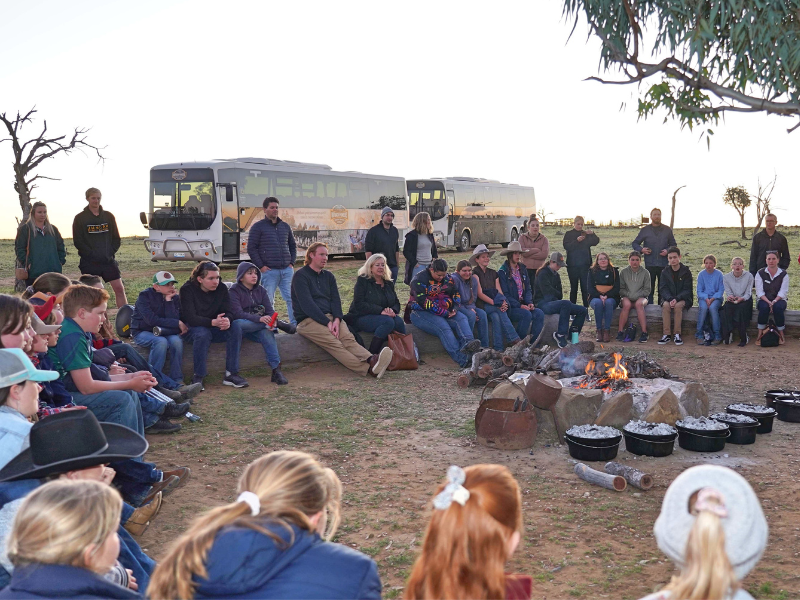
Thanks to donations from many generous supporters, 213 grassroots not-for-profit organisations (NFPs) across rural Australia will receive grants ranging from $465 to $50,000.
The projects will address diverse needs, including ongoing COVID and disaster recovery, strengthening community resilience and preparedness, and address small, yet vital, needs of remote, rural and regional communities.
Jill Karena, FRRR’s Place Portfolio Lead, said that wonderful volunteers in local groups continue to find meaningful ways to support their communities.
“One of the best parts of my job is seeing the way people in remote, rural and regional areas come together to support one another. We see it time and again in the projects that are put forward, usually led by volunteers, all of whom want to make things better for their community. So I want to acknowledge all those people and thank them for all they do.
“I know it’s tough, as the diverse impacts of successive shocks – COVID and various disaster events – continue to ripple through remote, rural and regional communities. The mental health implications of this sustained stress are clear but so too is the commitment to improving things, especially by combatting social isolation.
“Finding ways to connect with others and with their community is an important part of the healing and growing process and there are some creative solutions. In the southern Arnhem Land community of Ngukurr, in the Northern Territory, Wanta Aboriginal Corporation’s Ngukurr Bagai Barista Social Enterprise Cafe project is an inspiring example of the community working to reduce social isolation and foster resilience. The Corporation will use a $47,075 grant to create a community gathering space by fitting-out a café to be used as a vocational teaching site.
“We are also noticing an increase in creative recovery projects, as communities shift from responding to the immediate impacts of the pandemic or other disasters and begin to look at the longer-term recovery and resilience needs of their region.
“Mapleton State School in Queensland will use a $6,588 grant will support a therapeutic drumming program. The program is a creative way for the learning community to improve social connectedness, reduce levels of anxiety and enhance the process of recovery for young people from the pandemic. Similarly, the people of Gingin, Western Australia, will use their $10,000 grant to include wellbeing activities in the Flavours of Gingin Festival to help the community connect and build resilience.
“Our research has confirmed these kinds of arts projects have a unique ability to build long-lasting community resilience and wellbeing, and local capacity for disaster preparedness, response and recovery.[1]
“Not all the projects we’re supporting relate to disasters. There are also a range of initiatives that capitalise on opportunities or help to bridge service gaps, while other projects like a mural in Smithton will honour local Aboriginal heritage, culture and identity and help attract more visitors to the town.
“Since 2000, FRRR has delivered more than $155 million to nearly 13,000 projects, most of which are funded by small grants through programs like Strengthening Rural Communities. And we see the amazing impact that these small grants can have on a rural community.
“So it’s great to be awarding record funding this round and we look forward to seeing the difference it will make in the future,” Ms Karena said.
Record demand for grants
The reality is, FRRR would have liked to support far more projects, as there were many great initiatives seeking funding, with the impacts of inflation adding pressure to already small budgets and the capacity of locals to contribute to projects. However, FRRR simply didn’t have the funds to do so.
Ms Karena explains that projects like those that this program supports are often catalytic, so FRRR is actively seeking additional partnerships to enable more of these initiatives to get the support they need.
“Remote, rural and regional areas make up nearly a third of Australia’s population and generate approximately two-thirds of its net exports,[2][3][4] so ensuring the vitality of these communities is not only critical to the wellbeing of those who live in these places, but it’s also vital for a sustainable Australian economy.
“Grant programs, like SRC, are one way that we can work with government, business and philanthropy to ensure those communities remain attractive places to live and work. Flexible programs like SRC mean that communities can access funding to develop and lead projects that meet locally identified needs and priorities – which are often about bridging gaps in services that many in the cities take for granted, like public transport or being able to access health services, without travelling hundreds of kilometres. So we’d love to hear from anyone who might like to join with us to fund more of these initiatives.”
The SRC program is collaboratively supported by donors, ranging from private individuals to larger foundations, who are acknowledged on the FRRR website.
FRRR always accepts applications to this program, which awards funds roughly four times a year. Local NFPs and community groups are encouraged to review the program guidelines and apply. More information about the SRC program is available at www.frrr.org.au/src.
To support grants like this through FRRR, make a tax-deductible donation at frrr.org.au/giving/.
[1] https://frrr.org.au/wp-content/uploads/Impact-of-Creative-Recovery-Research-compressed-2.pdf
[2] https://www.aihw.gov.au/reports/rural-remote-australians/rural-and-remote-health
[3] https://www.infrastructure.gov.au/territories-regions-cities/regional-australia
[4] https://www.aph.gov.au/Parliamentary_Business/Committees/House/Former_Committees/Regional_Development_and_Decentralisation/RDD/Final_Report/section?id=committees%2Freportrep%2F024136%2F25543
The full list of grant recipients and their projects are below.
| Organisation | Project | Location | Grant | |||
|---|---|---|---|---|---|---|
| SRC Round 17 - September 2023 | ||||||
| NEW SOUTH WALES | ||||||
| Small & Vital | ||||||
| Circartus Incorporated | Systems Set Up Enhance organisational capacity to support the arts in Wingham by investing in office equipment and programs enabling efficient administration, communication and processing systems. | Wingham | $10,000 | |||
| Coolamon Community Incorporated | Coolamon Crib - Northern Rivers Casino Lismore Remote Expansion Aid 64 Indigenous mothers and infants in Northern Rivers with Coolamon Cribs and midwife services via Aboriginal Health Services, alleviating financial and emotional strain. | Lismore | $10,000 | |||
| Eurobodalla Shire Council | Be Well Eat Well - Building Connections Through Food Enhance community capacity and connection with weekly hands-on food education coaching sessions for six groups of 10 participants targeting seniors, parents and people living alone, led by a food educator and facilitator promoting health, nutrition and wellbeing. | Moruya | $9,840 | |||
| Give Them a Chance | Give Them a Chance to Be Their Best Create a youth life skills program connecting foster care youth (ages 10-19) with local retirees, fostering skill development, training, job prospects, and reducing social isolation while promoting wellbeing for both participant groups. | Lynwood | $10,000 | |||
| Glenreagh Public School | Aboriginal Art Mural Installation & Dance Lessons Promote cultural growth and connection, and celebrate Gumbanggirr culture for the underserved communities at Glenreagh Public School by commissioning an Indigenous mural by a local Elder and holding Aboriginal dance classes. | Glenreagh | $10,000 | |||
| Griffith Post School Options Limited | Griffith Post School Options Program Workshop Upgrade Support inclusive work and gardening programs for people with disabilities by upgrading the Griffith Post School workshop and building an accessible pathway. | Griffith | $9,500 | |||
| Hunter Fighter Collection Incorporated | Historic Bellman Conservation Hangar Mural Enhance tourism, foster community pride and promote awareness of Australia's cultural heritage and military history by painting a large mural at the Hunter Warbirds Restoration Facility in Scone. | Scone | $10,000 | |||
| Lennox Community Garden | Lennox Community Gardens Signage Enhance visitation and knowledge by developing a self-guided educational journey through Lennox Community Gardens' rare fruit tree orchards, featuring welcome info and informative botanical signage. | Lennox Head | $4,382 | |||
| Mudyala Aboriginal Corporation | Yugaamgan Festival - Raising Awareness of our Coastal Emu Host a full-day festival with local paid presenters sharing cultural stories, with a focus on education to raise awareness about coastal emus and address disadvantage in the community. | Wooloweyah | $10,000 | |||
| Parkinson's NSW Limited | Parkinson's Education and Support - Narrabri Improve the wellbeing of people with Parkinson's Disease in Narrabri through a community education seminar with allied health and Parkinson’s Disease specialists sharing information on managing symptoms and slowing progression. | Narrabri | $3,575 | |||
| Rotary Club Of Tocumwal Incorporated | WAAAF Creek Walk Picnic Tables Installation and Car Park Refurbishment Enhance tourism and engagement in natural and cultural history through refurbishing amenities at the Women’s Auxiliary Australian Air Force Creek Walk, an outdoor museum and WAAAF interpretive trail. | Tocumwal | $10,000 | |||
| Tomaree Neighbourhood Centre Inc | Indigenous Adult Art & Cultural Canvas Workshop, Plus Exhibition Build economic and cultural sustainability of the Woorimi Indigenous community and address disadvantage in the broader community through a culturally safe two-day canvas workshop by a local artist, including story, art and cultural education, culminating in a public art exhibition. | Tanilba Bay | $6,407 | |||
| Uralla Pre School Kindergarten | Eco-space: An Outdoor Classroom Convert an unused structure into an outdoor classroom space for sustainable, environmental and ecological education, promoting discovery and experimentation for the preschool children and their families. | Uralla | $10,000 | |||
| Warren Chamber Music Festival Incorporated | SING Warren-2-Sydney Enhance choir's technical skills and membership via workshops, performances and community sharing, cultivating an inclusive, all-ages singing environment to promote wellbeing and positive ageing. | Warren | $10,000 | |||
| Winmalee Neighbourhood Centre Inc | Lithgow Community Lunch Strengthen social engagement and connection by purchasing a freezer and kitchen equipment to prepare and offer free nutritious meals to community members, helping to alleviate poverty and disadvantage. | Winmalee | $6,000 | |||
| Wiradjuri Wellington Aboriginal Town Common (Aboriginal Corporation) | Social Inclusion Create a secure on-country space in Wellington for cultural programs, offering training in Aboriginal practices and art to drive community's social, cultural and economic aspirations. | Wellington | $7,999 | |||
| Prepare and Recover - 2019/2020 Bushfire Recovery | ||||||
| Araluen Progress Association Incorporated | Strengthening Community Fundraising Capacity by Developing an Outdoor Venue to Complement the Newly Restored Araluen Federal Hall Support bushfire recovery and hall running costs by installing a pergola and water tank in the rear garden of the Araluen Federal hall, creating an outdoor venue for hire and community functions. | Araluen | $7,572 | |||
| Bangalow Men’s Shed Incorporated | Connecting Generations and Communities Boost bushfire recovery with two inclusive community lunches and weekend gatherings four times a year to connect residents of all generations in a fun and relaxed setting. | Bangalow | $4,050 | |||
| Bega AP & H Society Incorporated | 2024 Bega Show Talent Festival Boost the local economy and support bushfire recovery by holding the Bega Talent Festival to showcase local artists, musicians and performers, fostering diversity and connectedness while increasing visitation. | Bega | $25,000 | |||
| Bellingen Community Arts Council Incorporated | Bellingen Shire Arts Trail Weekend Boost arts and culture in the bushfire-affected Bellingen Shire, promote tourism and honour creative workers with an Arts Trail weekend, featuring music, poetry, open studios, galleries and workshops. | Bellingen | $2,700 | |||
| Blicks Community Incorporated | Community Connection Improve community information sharing in Clarence Valley and Bellingen by creating an emergency plan, Facebook page and communication strategy for isolated areas to ensure reliable communication during bushfires. | Hernani | $10,000 | |||
| Caldera Farmers Market Murwillumbah Inc | Vibrant Community Hub and Farmers Market for a Healthier Future Boost visitation and the local economy in a bushfire impacted area by creating a dining, meeting and entertainment community hub within the farmers market. | Murwillumbah | $10,000 | |||
| Community Power Agency Co-Operative Limited | Guide to Biodiversity & Solar Contribute to bushfire recovery by producing a printed guide for residents and landowners on reducing land-use conflict and enhancing biodiversity and wildlife habitat on solar farm sites. | Armidale | $19,030 | |||
| CWA of NSW Toukley Country Womens Association of NSW | Toukley Hall Refurbishment Support bushfire recovery by refurbishing the decaying windows and doors at the Toukley Hall, ensuring its continued availability for community events and gatherings. | Toukley | $21,000 | |||
| Darkwood Disaster Resilience Group (DDRG) Neighbourhood Care Network Incorporated | The Safer Valley Project Enhance bushfire preparedness with a community-led Community Disaster Plan (CDP) and cultivate community connectedness by launching the draft CDP at a fun community gathering for feedback and discussion. | Darkwood | $9,980 | |||
| Diamond Women Ltd | Mum2Mum Community and Connection Perinatal Program Improve support for young and vulnerable women in bushfire impacted Tumbarumba with the monthly Mum2Mum community-based mental health support and wellbeing program. | Tumbarumba | $10,000 | |||
| Disability Club Connections Plus Australia Incorporated | Disability Club Create and promote a mobile app and upgrade the Disability Club web version to enhance the accessibility of the disability platform, fostering social wellbeing, inclusivity and connections in the bushfire-affected community. | Bega | $25,000 | |||
| Eden Services & Social Club Inc | Stafford McGovern Historic Brickworks Site Rehabilitation Restore a historic site damaged in the 2019/20 bushfires by restoring the 1890’s mobile brickworks site through removing debris, recovering relics and installing an informative plaque and table with seating for walkers and cyclists. | Eden | $6,475 | |||
| Edith Recreation Reserve Land Manager | Edith Recreational Kitchen and Heater Enhance disaster preparedness by installing a community kitchen in Edith Hall to serve as a catering facility, marshalling and logistics area and rest space for emergency services. | Edith | $9,934 | |||
| Federal, Goonengerry and Eureka Community Resilience Team Federal Community Centre Incorporated | Federal, Goonengerry and Eureka Hinterland Community Resilience Teams Emergency Communication System Enhance local disaster readiness and empower the community to manage communication disruptions caused by bushfires and other disasters by purchasing a portable UHF communication system. | Federal | $23,230 | |||
| Forster Neighbourhood Centre Inc | Return of Child and Family Support to Vulnerable Families in Outlying Communities Enhance organisational capacity by purchasing a vehicle to provide support to isolated families and in-home assistance for vulnerable families, facilitating reconnection and rebuilding in bushfire-affected communities. | Forster | $25,000 | |||
| Global Care Australia | Increase our Chilled and Frozen Food Capacity Strengthen organisational capacity to store and distribute chilled, frozen and other perishable food to support disadvantaged people in the bushfire-affected community of South Grafton. | South Grafton | $24,987 | |||
| Iluka Community Organisation Planning for Emergencies (ICOPE) Inc | Balanced Connections: An Exercise and Social Connections Program for Older Adults Enhance wellbeing in fire-affected Clarence Valley through a seven week exercise program for residents aged over 55, boosting mental and physical health, strength and balance. | Iluka | $8,411 | |||
| Killabakh Public Hall Land Manger | Upgrade of Kitchen Stove Support bushfire recovery and fundraising efforts by upgrading the gas stove at the Killabakh Hall, improving facilities for volunteers to cater for community events. | Killabakh | $5,835 | |||
| Lanitza / Kungala Community Hall Committee Incorporated | Boredom Relief Create a vibrant youth centre in bushfire-affected Lanitza, providing essential resources for children to study, unwind, socialise and foster positive mental health and relationships. | Lanitza | $6,699 | |||
| Lions Club of Tea Gardens Inc | Service Community Safe Storage Project Support bushfire recovery by replacing and upgrading the damaged storage container used by volunteers to ensure safe and secure storage of equipment for community events. | Tea Gardens | $23,882 | |||
| Mongarlowe Volunteer Bushfire Brigade | Completing the Mongarlowe Fire Shed Kitchen Enhance bushfire preparedness through the completion of the Mongarlowe Fire Shed kitchen extension to expand capacity for disaster response. | Mongarlowe | $12,627 | |||
| Moruya Antique Tractor and Machinery Association Incorporated | Mogo Artisans Project Rebuild the Mogo museum and workshop destroyed by the 2019 bushfires, replenish lost equipment and incorporate a food bank and pantry, creating a community and visitor space. | Mogo | $25,000 | |||
| Mullumbimby Sustainability Education and Enterprise Development Incorporated | Seasonal Gatherings Celebrating Our Community Resilience and Diversity Enhance resilience, social inclusion, and diversity post-bushfire through quarterly workshops, events and activities celebrating Indigenous culture, diverse communities and environmental education. | Mullumbimby | $10,000 | |||
| Music Theatre Projects Limited | Fire - Reclaiming Another Forgotten Play by Playwright and Farmer, Millicent Armstrong Contribute to bushfire recovery by hosting a first reading of Millicent Armstrong's award-winning yet forgotten play "Fire" as part of the Gunning Arts Festival, fostering socialisation and community engagement with the arts. | Gunning | $4,800 | |||
| Neighbourhood Care Network Incorporated | Plan, Connect, Protect - Community Disaster Preparedness Across the Bellingen Shire Enhance local risk awareness, including bushfires and weather events, and bolster household and neighbourhood disaster preparedness through organising readiness events. | Urunga | $24,920 | |||
| New England Garden Festival Incorporated | New England Garden Festival Enhance tourism, community connection and bushfire recovery through educational talks, youth activities, cultural performances and hands-on workshops at the New England Garden Festival celebrating cool climate and high-country gardens. | Armidale | $10,000 | |||
| Nimbin Neighbourhood and Information Centre Incorporated | Nimbin Disaster Resilience - Energy Security Project Enhance bushfire preparedness at the Nimbin Neighbourhood House and Information Centre by upgrading the solar system to ensure uninterrupted delivery of essential services with backup power during emergencies. | Nimbin | $25,000 | |||
| Pambula Beach Surf Life Saving Club Inc | Expansion of Emergency and Bushfire Response Capabilities Strengthen emergency and bushfire response capacities at Pambula Beach Surf Life Saving Club by purchasing a 4WD vehicle for lifesaver patrols, search and rescue, and to assist residents and tourists during disasters. | Pambula Beach | $25,000 | |||
| Port of Yamba Historical Society Inc | Strengthening and Consolidating Our Connection with the Local Yaegl Community Support Yamba's bushfire recovery and foster a stronger relationship with Yaegl Elders through collaborating to expand the museum timeline with oral history / storytelling and cultural artefact donations. | Yamba | $17,000 | |||
| Rocky Hall Community Association Incorporated | Rocky Hall Kitchen Upgrade Contribute to bushfire recovery by upgrading the Rocky Hall's kitchen, encouraging increased use, fostering community spirit and facilitating gatherings and activities for residents. | Rocky Hall | $9,191 | |||
| Scone Neighbourhood Resource Centre Incorporated | Art Trail in Our Garden Promote community inclusion and creative bushfire recovery with a local workshop on starting a street art business and collaborating on a neighbourhood centre native animal mural. | Scone | $6,985 | |||
| South East Arts (NSW) Inc | Giiyong Festival 2023 Aid bushfire recovery by assisting local First Nations people to join the Gilyong Festival production team, acquiring event management and production skills while delivering a multi-arts Aboriginal cultural event in Eden. | Eden | $25,000 | |||
| Southcoast Health and Sustainability Alliance | Heatwave and Bushfire Haven Priority 1 Anglican Campus Batemans Bay Contribute to emergency preparedness following the 2019/20 bushfires by establishing a heatwave and bushfire haven community space offering a safe refuge with a focus on helping the most disadvantaged individuals. | Batemans Bay | $24,657 | |||
| Towamba Rural Fire Brigade | Essential Improvements for an Internal Office and a Base Station Communication Room Enhance bushfire preparedness and organisational capacity at the Towamba Rural Fire Brigade by acquiring and outfitting a stand-alone flat cuby to serve as an office and base station communication room, creating additional space for vehicle parking. | Towamba | $16,800 | |||
| Upper Lansdowne Memorial Hall Committee Incorporated | Hardening the Hall Against Bushfires Enhance bushfire preparedness and protection for the Upper Lansdowne community by upgrading the Hall to transform it into a neighbourhood emergency shelter. | Upper Lansdowne | $10,944 | |||
| Prepare and Recover - 2021 & 2022 Floods | ||||||
| Armidale Family Support Service Inc | Be Well Tools 4 Us Strengthen isolated New England towns’ resilience post flooding with after-hours and weekend social BBQs that also offer information about support networks and coping methods to enhance social wellbeing. | Armidale | $17,250 | |||
| Barkers Vale, Lillian Rock, Wadeville & Cawongla-Community-led Resilience Teams Wadeville (R91046) Reserve Land Manager | 'Bounce Back' Community Communications Network Enhance flood preparedness with two permanent disaster management hubs for local emergency information sharing, distribution of 60 UHF handsets in high-risk areas, and UHF radio training in Kyogle. | Barkers Vale | $24,290 | |||
| Bugaldie War Memorial Site Land Manager | Let's Light Up the Future Improve the safety and use of the Bugaldie Hall as an emergency and community gathering place through electrical and lighting upgrades. | Bugaldie | $9,345 | |||
| Cawongla Playhouse Inc | Cawongla Community Centre - Where the 3 Roads Meet - Equipping Our Centre Upgrade the Cawongla Community Centre’s furnishings and equipment to ensure it continues to be a key community point, aiding post-flood recovery. | Cawongla | $8,176 | |||
| Crabbes Creek Community Hall Inc Crabbes Creek Hall Committee Inc | Crabbes Creek Community Communications (CCCC) Enhance flood recovery and preparedness by installing an emergency CB repeater covering Crabbes Creek, Wooyung and Yelgun, ensuring isolated community members can communicate during emergencies. | Crabbes creek | $23,500 | |||
| Eugowra Community Children's Centre Incorporated | Supporting Superheros to Learn and Grow Support flood recovery by purchasing equipment for the Eugowra Community Children's Centre, fostering children's learning, wellbeing, social development and resilience-building. | Eugowra | $25,000 | |||
| Eugowra Promotion and Progress Association Incorporated | Shipping Containers for Storage Support flood recovery by purchasing three shipping containers to store community assets from local organisations that have lost storage space due to water-damaged buildings. | Eugowra | $12,540 | |||
| Murwillumbah CORE Hub 2484 Murwillumbah Core Incorporated | M|CORE Connecting Community Grill Foster recovery and social connectedness post-flood with a purpose-built BBQ / kitchen and trailer to offer meals to vulnerable residents. | Murwillumbah | $10,000 | |||
| Parkes Community Arts Inc | Who Is Parkes? Aid flood recovery via tourism and community engagement with a shire-wide photography project displaying resident portraits and stories in a gallery and on large buildings, showcasing community diversity at Parkes' 150-year naming anniversary. | Parkes | $9,845 | |||
| Raise the Heart Ltd | Here for heART - A Free Mental Health Education and Wellbeing Project for the Northern Rivers Connect wellbeing providers and community agencies to host a depression-comedy theatre show and wellbeing forum to support flood recovery and provide mental health education on suicide prevention. | Mullumbimby | $17,000 | |||
| Richmond Landcare Incorporated | Garden Habitat Heroes: Restoring Hope, Wildlife and Community Resilience Support Lismore's flood recovery with workshops for self-healing, garden restoration, wildlife-friendly habitats and biodiversity to reconnect communities and bring back joy to gardeners. | Lismore | $24,450 | |||
| Save Nambucca River OZ Green-Global Rivers Environmental Education Network (Australia) Incorporated | Nambucca Riverwatch - Citizen Science Water Testing Boost flood recovery and preparedness with a Nambucca River Riverwatch project, conducting monthly water monitoring and sharing change-driven data with the community through two workshops. | Nambucca Heads | $22,942 | |||
| The Bridge Art Project Inc | Activation of 17ha of Bridge Art Project Rrecinct - Developing a Community Resource Enhance community involvement and gallery fundraising by clearing flood debris and vegetation from a designated bush block for the upcoming art gallery. | Moama | $10,000 | |||
| Wardell Community Organised Resilience Effort Inc | Help Them Home - Wardell Recovery Boost community resilience by equipping locals with skills, resources, networks and project management to restore their flood-damaged homes. | Wardell | $10,000 | |||
| Whian Whian Memorial Hall Incorporated | More Solar, Better Prepared for Future Disasters and Making us More Power Efficient Enhance flood recovery and preparedness, and organisational sustainability by reducing operational costs through installing additional solar panels, battery system and solar hot water in the Whian Whian Memorial Hall. | Whian Whian | $24,275 | |||
| Rebuilding Regional Communities - Micro | ||||||
| Bathurst Information and Neighbourhood Centre Incorporated | Rebuilding Oberon Community's Volunteer Base Sustain Oberon organisations post-pandemic by reinstating a volunteer program with a dedicated support worker recruiting, training and matching volunteers with community roles. | Oberon | $7,000 | |||
| Bellinger Valley Historical Society Bellingen Shire Council | Improving Ventilation in the Urunga Museum Sustain the historic Urunga Museum and their work post-pandemic and improve safety and amenity by replacing old windows. | Urunga | $9,096 | |||
| Carries Place Domestic Violence and Homelessness Services Incorporated | Therapeutic and Wellbeing Group-work Sessions Facilitate healing and recovery from domestic and family violence exacerbated by the pandemic, reduce social isolation and foster resilience through therapeutic wellbeing sessions for women. | Cessnock | $9,860 | |||
| Coonamble Neighbourhood Centre | Coonamble Womens Paint, Play and Bend - Women's Wellness Event to Reengage after COVID Rebuild connections, reduce social isolation and foster a stronger, more resilient Coonamble region after COVID-19 through women's yoga, music and mental wellbeing events. | Coonamble | $10,000 | |||
| Hay Mardi Gras | LGBTQIA+ Flag Interactive Exhibition Reduce social isolation and foster a stronger, more resilient community by encouraging acceptance, diversity and inclusion through an LGBTQIA+ Interactive Flag Exhibition as an extension of the Hay Rainbow on the Plains Festival. | Hay | $10,000 | |||
| Murravale Retirement Home Ltd | Reconnecting Murravale with the Community Foster reconnection, boost volunteerism and decrease post-pandemic social isolation via networking events uniting local interest groups to enhance community resilience and organisational capacity. | Murrurundi | $9,800 | |||
| NSW Service for the Treatment and Rehabilitation of Torture and Trauma Survivors (STARTTS) | Multilingual Info Co-Op (MICO) Enhance emergency response, public safety and social connectedness post-COVID-19 by engaging bi-cultural volunteers to offer in-language information and resources to CALD refugees, asylum seekers and migrants. | Coffs Harbour | $8,195 | |||
| Queer Family Inc | The Sign Project Encourage connection, reduce social isolation and increase inclusion post-pandemic through a series of art workshops to create emblematic signage for a new LGBTQIA+ community space. | Mullumbimby | $9,843 | |||
| St Vincent De Paul Society NSW | Vinnies Wagga Wagga - Connect and Play Playgroup Enhance the recovery of socially isolated refugees, asylum seekers and disadvantaged residents post-pandemic by enabling an inclusive playgroup to provide weekly sessions with free transport for participants. | Wagga Wagga | $10,000 | |||
| Tantrum Youth Arts Co-op Ltd | Outpost Singleton Increase equity of access and reduce social isolation post-pandemic by facilitating a series of free weekly creative arts workshops aimed at disadvantaged young people. | Singleton | $10,000 | |||
| The Black Stump Craft Shop | Coolah Craft Shop Proposed Alternations - Kitchen and Bathroom Areas Rebuild connections, reduce social isolation and foster a stronger community post-COVID-19 with kitchen and bathroom upgrades at a community hub. | Coolah | $9,963 | |||
| The Mend & Make Do Crew Inc | Thriving Together: Building Capacity for Sustainable Communities Ameliorate effects of COVID-19 on a community arts hub and sustain their work through training and support to build organisational and volunteer capacity, skills and governance. | Grafton | $8,662 | |||
| Tullamore Inc | New Vinyl - Fresh Look - Safe Environment Increase safety, amenity and hygiene and sustain the work of the Tullamore Preschool post-pandemic by installing new vinyl floorcoverings. | Tullamore | $10,000 | |||
| Rebuilding Regional Communities - Large | ||||||
| Broken Hill Community FM Association Inc | Upgrading Broken Hill's Community Radio Studio Expand the capacity of 2DRY FM to continue providing an inclusive community media platform and sustain the work of volunteers post-pandemic through accessible studio upgrades. | Broken Hill | $30,000 | |||
| Northern Gomeroi Aboriginal Corporation | Facilities for Boggabilla Men's Shed Support mental health and wellbeing, reduce social isolation in a regional border community post-pandemic, and provide an inclusive, safe place for men to gather and learn new skills by connecting utilities to a Men's Shed site. | Boggabilla | $50,000 | |||
| The Australian Literacy and Numeracy Foundation Limited | The Early Language and Literacy (EL&L) Far West Project Address educational disparity and aid post-COVID-19 recovery of children in a remote region with an innovative adult upskilling program, empowering them to boost early language and literacy skills. | Wilcannia | $50,000 | |||
| NORTHERN TERRITORY | ||||||
| Small & Vital | ||||||
| Mataranka Primary School | Mataranka School - Outdoor Learning and Cultural Engagement Space Increase the community’s involvement in their children’s education by developing an outdoor classroom for cultural activities and intergenerational transfer of knowledge. | Mataranka | $7,873 | |||
| Remote and Isolated Support in Education Ltd | Accessible Early Education Experiences for Rural & Remote Families - Pilot Project Help families living remotely to engage with their peers while accessing early childhood educational resources and specialists by creating an interactive website and online playgroup. | Jervois Homestead, Anatye | $10,000 | |||
| Tangentyere Council Aboriginal Corporation | Heart of Akngwertnarre Support residents to connect and encourage children's learning and development through play by revitalising the Town Camp’s playground. | Alice Springs | $10,000 | |||
| Rebuilding Regional Communities - Micro | ||||||
| Dundee Beach School Council | Enhance Community Playgroup - Early Learning Equipment Enhance the process of recovery of an isolated community post-pandemic by purchasing age-appropriate play-based resources and equipment for a community playgroup to ameliorate educational and social disadvantages. | Dundee Beach | $10,000 | |||
| Rebuilding Regional Communities - Large | ||||||
| Jilamara Arts and Crafts Association | Legally Strong Tiwi Artists and Art Centres Enhance the process of recovery for Tiwi Island communities post-COVID-19 and strengthen the local economy by boosting the ability and skills of three local art centres to provide high quality legal advice. | Milikapiti, Melville Island | $20,000 | |||
| Wanta Aboriginal Corporation | Ngukurr Bagai Barista Social Enterprise Cafe Create a community gathering space to reduce social isolation and foster resilience in the southern Arnhem Land community of Ngukurr post-pandemic through the fit-out of a café to be used as a vocational teaching site. | Ngukurr | $47,075 | |||
| QUEENSLAND | ||||||
| Small & Vital | ||||||
| Blackbutt & Benarkin Aged Care Assoc Inc | Feasibility of Building Independent Living Units for Aged Care Residents Strengthen social connection for aged residents by exploring opportunities to develop custom-built housing within the community. | Blackbutt | $10,000 | |||
| Burke Shire Council | Stage 1 - Community Garden for Burketown Residents Help the community reconnect following significant flooding and enhance food security during the wet season by establishing a community garden. | Burketown | $25,000 | |||
| Butchers Creek Hall Association Incorporated | Replace Incorrect Old Signage Celebrate and build community spirit by replacing inaccurate hall establishment signage for the centenary event. | Butchers Creek | $973 | |||
| Cairns Region Toy Library Inc | Digitisation of Services and New Toys Build volunteer capacity by digitising the toy catalogue and borrowing process to increase children's access to high quality toys and learning aids. | Atherton | $10,000 | |||
| Canungra Men's Shed | Shipping Container for Safety Improve the experience of shed members by improving the working and storage areas through installing a shipping container. | Canungra | $4,000 | |||
| Disability Matters Inc | Soundplay Expansion Enable all community members to participate in creative and musical activities by building a wheelchair accessible performance space. | Atherton | $9,751 | |||
| Kumbia Neighbourhood Watch - Rural Association Incorporated | Multi-Purpose Facility Upgrade Expand the use of Kumbia Memorial Hall through purchasing new chairs and tables to make the community’s meeting space more functional. | Kumbia | $9,420 | |||
| Maryborough and District Animal Refuge Society Inc | Waterproof Shade Cloth for Volunteer Area Support volunteers by providing an undercover space to use during rest breaks. | Maryborough | $2,592 | |||
| Mundubbera Show Society Inc | Supporting our Country and Community Improve the organisation’s ability to hold community events by purchasing IT, kitchen and storage equipment to support volunteer roles. | Mundubbera | $9,500 | |||
| Napranum Aboriginal Shire Council | Napranum Early Childhood Centre - Edible Garden Enhance First Nations children’s health and wellbeing outcomes and build cultural connections with community Elders through establishing an edible garden. | Napranum | $6,020 | |||
| Returned & Services League of Australia (Queensland Branch) Esk Sub Branch Inc | Esk RSL Sub Branch Refrigerator Provide a safer environment for social connection by replacing the old fridge to improve food safety. | Esk | $3,354 | |||
| Returned & Services League of Australia (Queensland Branch) Tiaro Sub Branch Inc | Tiaro RSL Sub Branch New Front Stairs Rejuvenate the 1930’s building by replacing the front stairs to make the community meeting space safer and more welcoming. | Tiaro | $10,000 | |||
| Roadvale School of Arts Inc | Purchase of Two Fridges to Support Community Activity at the Roadvale Hall Enhance community hall use by upgrading fridges to improve food safety. | Roadvale | $9,996 | |||
| Stanthorpe International Club | Installation of Solar Panels Improve the Club's financial capacity to support the community with power cost savings created by installing a solar system. | Stanthorpe | $10,000 | |||
| The Townsville Toy Library Association Inc | Townsville Toy Library Solar Installation Enhance the library’s ability to support the flood-impacted community by installing a solar system to reduce operational costs. | Townsville | $10,000 | |||
| Westmar State School P&C Association | Enhance Inquiry-Based Learning at Westmar State School with STEM Resources Foster students’ curiosity and lifelong learning by purchasing a STEM activity cart and engaging critical thinking and problem-solving skills. | Westmar | $10,000 | |||
| Prepare and Recover - 2019/2020 Bushfire Recovery | ||||||
| A-Choired Taste | Scenic Rim Sings 2023 Boost spirits and help recovery of bushfire-impacted community by hosting a public singing workshop. | Beaudesert | $3,715 | |||
| Canungra Sports and Recreation Reserve Grounds Inc | Upgrade Driveway to our Creek Camping Area and Holding Yards Improve emergency services access and livestock evacuation during disasters by sealing the driveway at a Black Summer Bushfires staging area. | Canungra | $22,731 | |||
| Tarome Rural Fire Brigade Queensland Fire and Rescue Authority | Fire Fighting Accessories & Upgrades for Buggy Strengthen the community’s fire-fighting ability with the purchase and fit out of an all terrain buggy and buggy trailer for transporting equipment. | Tarome | $17,935 | |||
| The Yoga Partnership Ltd | Yoga for Granite Belt Support Services Strengthen mental and physical health of the bushfire-impacted community with fortnightly yoga and mindfulness classes for all ages and all abilities. | Stanthorpe | $3,000 | |||
| Prepare and Recover - 2022 Floods | ||||||
| Burdekin Singers & Theatre Company Inc | Replacing 'The Lighthouse' Roof Create a safe environment for the community to come together for social and creative activities post flooding by repairing the aged theatre roof. | Ayr | $25,000 | |||
| Forest Hill School of Arts | Forest Hill Floor Treatment and Repairs Ensure the continued use of the hall for community gatherings and as an evacuation centre by re-sealing the floor, which was damaged during the last flooding event. | Forest Hill | $7,500 | |||
| Greenup Events Group Inglewood Lions Club Inc | Showcase at Greenup Nurture recovery and social wellbeing for a flood-impacted community by offering creative workshops at the local arts festival. | Inglewood | $3,000 | |||
| Heart of Gold International Short Film Festival Inc | Boredom Relief Enhance young people's wellbeing and career opportunities in a flood-impacted community by sharing their creative works at a local film festival. | Gympie | $22,300 | |||
| Lanescape Goondiwindi Inc | Illuminate the Flow Provide an opportunity for the flood-impacted community to reconnect, strengthen their resilience and boost tourism through creating a mural illustrating the community’s ability to overcome adversity. | Goondiwindi | $25,000 | |||
| Mulgowie Public Hall Association Incorporated | Repairs to Grounds Revitalise the hall’s flood-damaged outdoor space by replacing playground softfall and concreting below seating. | Mulgowie | $10,000 | |||
| Mungindi Community Preschool Inc | Celebrating 50 Years of the Mungindi Community Preschool Reconnect residents and provide a sense of identity and belonging post floods by holding a community fair. | Mungindi | $5,893 | |||
| Neighbourhood Centre Maryborough Inc | Out & About Help young people impacted by flooding learn about and connect to support services by holding an informal youth day in the ‘skate’ park event. | Maryborough | $10,000 | |||
| Theebine Memorial Recreational Centre Incorporated | Community Safety and Wellbeing Boost the community's ability to respond to future floods by purchasing a generator and installing communication and security equipment at the hall, which is used as a recovery centre. | Theebine | $9,427 | |||
| Rebuilding Regional Communities - Micro | ||||||
| Biloela State High School | Easy Access Support young people and enhance recovery post-pandemic by creating a labyrinth as a safe space for students to engage with others and to conduct psychosocial support activities. | Biloela | $10,000 | |||
| Kuranda Amphitheatre Society Inc | Amphitheatre Enquiry-by-Design Re-energise the community venue post-pandemic by facilitating an inclusive, community-based design process for an updated facility master plan and maintenance schedule. | Kuranda | $10,000 | |||
| Mapleton State School P&C Association | Rhythm to Recovery: Building Resilience and Social Connectedness Through African Drumming Improve social connectedness, reduce levels of anxiety and enhance the process of recovery for young people from the pandemic by establishing a therapeutic drumming program. | Mapleton | $6,588 | |||
| North Burnett Community Service Inc | Born To Play Support a new regional playgroup and sustain their work to encourage social connection and improve educational outcomes after COVID-19 through purchasing activity resources and play equipment. | Mundubbera | $9,920 | |||
| Steaming on the Downs Inc | Community Lost Trade Skills Workshop & Demonstrations - Container for Transport Boost pandemic recovery and social connectedness through procuring a shipping container to transport metalworking equipment by rail to use in skill building workshops with young people. | Oakey | $4,180 | |||
| Rebuilding Regional Communities - Large | ||||||
| Binthi Land Holding Group Aboriginal Corporation | Mt Baird Station Homestead Water Infrastructure Enhance post-pandemic recovery and improved economic opportunities, health conditions and morale of a remote First Nations community by providing a potable water supply. | Hopevale | $35,008 | |||
| Ingham Meals On Wheels Inc | Making Meals and Making Connections Sustain the work of volunteers post-pandemic to provide meals and essential social connections to vulnerable residents through the purchase of a commercial dishwasher. | Ingham | $22,403 | |||
| Kalbar School of Arts & Memorial Hall Inc | Upgrading the Kalbar School of Arts Memorial Hall to Promote a Vibrant Rural Community Enhance the process of recovery for the Kalbar community post-pandemic and provide a safe and inclusive community hub by undertaking essential hall repairs and preserving its all-ability access. | Kalbar | $37,570 | |||
| SOUTH AUSTRALIA | ||||||
| Small & Vital | ||||||
| Cradock Heritage Group The Flinders Ranges Council | Re-print of the Cradock Heritage Trail Booklet Boost visitation to a historic township and enhance community pride by updating a walking trail guide that celebrates local heritage. | Cradock | $2,430 | |||
| Glendambo District Sports Club Incorporated | Secretary's/ R FDS Shed and Kids' Play Container Enhance wellbeing outcomes and sustain organisational capacity by installing a shipping container to provide storage and a space for pop up RFDS health clinics at community events. | Glendambo | $10,000 | |||
| Quorn Mercury Association Incorporated | New Computers for the Quorn Mercury Build connections and keep the community informed by updating IT equipment for the publication of a monthly community newsletter. | Quorn | $5,337 | |||
| Prepare and Recover - 2019/2020 Bushfire Recovery | ||||||
| Art Museum of Kangaroo Island Establishment Association Incorporated | Equipment and Storage for Planning Stage of AMKI Project Increase volunteer and organisational capacity and support community recovery after bushfires by providing storage and digital equipment for an art gallery. | Penneshaw | $1,444 | |||
| Edithburgh Museum Inc | Edithburgh Jetty 150th Anniversary Celebration Support recovery from bushfires and boost community connections by commemorating local history through a photographic exhibition and book publication. | Edithburgh | $10,000 | |||
| Palmer Collier Park Community Association | Davenport Rest Stop & Historical Landmarks Trail Enhance connection to place and boost visitation in a bushfire-impacted region through installing signage for a historic trail. | Palmer | $7,633 | |||
| Stansbury Sports and Community Club Inc | Internal Salt Damp Repairs Provide a safe and comfortable facility for senior citizens and enhance social connections to support bushfire recovery by repairing salt damaged walls at a community hub. | Stansbury | $10,000 | |||
| The Warooka Progress Asscn | Moving Murals: Augmented Reality Strengthen cultural connection and encourage tourism in a bushfire-impacted region through the installation of an innovative mural trail. | Warooka | $25,000 | |||
| TULKA Progress Association | Security for New Infrastructure and Increase Water Harvesting Capacity Strengthen bushfire preparedness and organisational capacity at a community hub by upgrading facilities and water storage for firefighting. | Tulka | $10,585 | |||
| Unity College Inc | Playground Shade Structure Rejuvenate a place to gather and support bushfire recovery of young people in a disadvantaged community by installing a shade structure in a play area. | Murray Bridge | $10,000 | |||
| Prepare and Recover - 2022 Floods | ||||||
| Mid Murray Support Service Incorporated | Welcome to The HUB Strengthen community recovery in a flood-impacted region and sustain organisational capacity by upgrading the reception area at a support service to create a welcoming and inclusive space for community members. | Mannum | $22,695 | |||
| Rebuilding Regional Communities - Micro | ||||||
| Bay Town Group Association Incorporated | Chris Blowes - Motivational Speaker Strengthen social connections and foster resilience in young people following the pandemic by holding an event with a motivational speaker. | Port MacDonnell | $1,600 | |||
| Lipson Progress Association | Preserving the Past, Preserving the Future Encourage social connection at a key community hub following the pandemic by repainting the interior spaces of the historic Lipson Big and Small Halls. | Lipson | $8,300 | |||
| Sandalwood Recreation Association Incorporated | Ease of Access for All Enhance community connection after COVID-19 by installing a ramp and new doors to improve access for all abilities at a community hall. | Sandalwood | $9,618 | |||
| West Coast Youth and Community Support Incorporated | Secure, Safe and Vibrant Youth Hub Improve safety and amenity and boost opportunities for social connection after COVID-19 by upgrading facilities and furniture at a youth hub. | Port Lincoln | $10,000 | |||
| Rebuilding Regional Communities - Large | ||||||
| Kyancutta Community Club Incorporated | New Outdoor Area for the Kyancutta Community Club Reduce social isolation and foster resilience post-pandemic in a very remote community through developing a family-friendly outdoor play space at a community hub. | Kyancutta | $30,000 | |||
| TASMANIA | ||||||
| Small & Vital | ||||||
| Great Lake Community Centre Inc | Great Lake Community Centre Extension Project Expand skills to provide locally grown food for people living in a remote, high-altitude township by purchasing a trailer and building materials for a community greenhouse garden. | Miena | $10,000 | |||
| Queenstown Community Men's Shed West Coast Council | Queenstown Community Permaculture Garden Build social connections and skills to 'grow your own food' through the establishment of a community garden in an isolated and under-served region. | Queenstown | $10,000 | |||
| The Circular Head Aboriginal Corporation | Community Mural Project Celebrate First Nations history by creating a storytelling mural depicting Aboriginal heritage, culture and identity significant to the Circular Head district. | Smithton | $10,000 | |||
| Youth Family and Community Connections Incorporated | ARVOs Program - Activity Costs Reduce social isolation and strengthen connections between young people by supporting an out of school activity program to deliver workshops and excursions. | Burnie | $10,000 | |||
| Prepare and Recover - 2019/2020 Bushfire Recovery | ||||||
| Seymour Community Action Group Inc | Seymour Community - Wetlands Restoration Project Strengthen community bushfire recovery activities to restore natural habitat and enhance community connection to the environment through a weed eradication project. | Seymour | $10,000 | |||
| Prepare and Recover - 2022 Floods | ||||||
| Meander Valley Connect Inc | Meander Valley Connecting Up Foster social connection and skill development by delivering digital training and outreach for seniors and under-served community members in a flood-impacted region. | Deloraine | $24,917 | |||
| Rebuilding Regional Communities - Micro | ||||||
| Rural Alive & Well Inc | Country Outreach - King Island Connection Strengthen mental health and wellbeing after the pandemic in a remote island community by delivering in-person mental health and suicide prevention outreach services. | Pegarah | $10,000 | |||
| Rebuilding Regional Communities - Large | ||||||
| Rural Health Tasmania Inc | Embracing Community Rebuild social connections and enhance wellbeing following the impacts of COVID-19 by delivering a facilitated social inclusion program and activities in partnership with a community house. | Smithton | $44,600 | |||
| VICTORIA | ||||||
| Small & Vital | ||||||
| Alexandra Primary School | Alexandra Primary School Sensory and Nature Play Garden Expand educational enrichment opportunities and create a space for school children to connect with the natural environment by installing a sensory and nature play garden. | Alexandra | $10,000 | |||
| Arapiles Historical Society Inc No A0037695M | Community and Infrastructure Protection Sustain the work of older volunteers to collect, preserve and celebrate local history by repairing a damaged roof of an historic building. | Natimuk | $10,000 | |||
| BCYF – Bethany Limited | Ageless Connections Support relationship building and provide a social outlet for older people through the delivery of an intergenerational activity program at a local kindergarten. | Colac | $9,901 | |||
| Callignee and Traralgon South Emergency Committee | Raising Awareness Program 2023 Augment community knowledge and strengthen disaster response by distributing a free emergency services brochure to residents living in a bushfire prone district. | Callignee | $465 | |||
| Foster Primary School | Reinvigorating our Kitchen Garden Program Equipment Boost health outcomes and student knowledge in growing and cooking nutritious food from the school's garden by upgrading kitchen equipment. | Foster | $4,850 | |||
| Grants Only Group Inc | Digital Solutions Sustain community groups in South Gippsland and strengthen volunteer capacity to seek grants through upgrading IT equipment. | Venus Bay | $2,423 | |||
| Leongatha Childrens Centre Inc | Shade Umbrellas Encourage play-based learning by providing sun protection at a new community-run childcare and kindergarten centre. | Leongatha | $6,497 | |||
| Murray Valley Aboriginal Co-operative Limited | MVAC Bush Kinder Enhance access to First Nations cultural practices and nature-based play by installing a dual toilet / wash basin facility for a new bush kinder program. | Robinvale | $10,000 | |||
| Noojee Parks & Reserve Committee of Management | Meet & Move for Health Enhance older people’s health and social wellbeing by delivering a weekly exercise class at Noojee Hall. | Noojee | $6,568 | |||
| Rupanyup Primary School | Shade Protection for our Outdoor Inclusive Learning, Sensory & Play Space Improve health, safety and comfort of school children by providing protection from UV exposure through installing shade sails. | Rupanyup | $10,000 | |||
| St Arnaud Community Resource Centre Inc | FoodShare and Volunteer Kitchen Completion Enhance food security and wellbeing outcomes for under-served community members and sustain the work of volunteers by upgrading a kitchen to meet health regulations. | St Arnaud | $5,000 | |||
| Surf Lifesaving Lakes Entrance Inc | Upgrade of First Aid Facilities Improve volunteer safety and emergency response capability by upgrading training and medical equipment at a surf lifesaving club. | Lakes Entrance | $5,522 | |||
| Tarwin Lower Primary School | Playground Revival Create a safe environment and foster greater school engagement by replacing an aged and unsafe playground with new play equipment for the school, playgroup and wider community use. | Tarwin Lower | $10,000 | |||
| Venus Bay and District Community Emergency Response Team Inc | Advanced Medical Manikins Training Equipment Build capability of emergency first aid volunteers and strengthen community health and safety outcomes by purchasing CPR training equipment. | Venus Bay | $9,751 | |||
| Yea & District Historical Society Inc | Printer / Scanner for Yea Historical Society Enhance volunteer capacity to preserve and catalogue historic data and contribute to local cultural celebrations by purchasing compatible digital equipment. | Yea | $498 | |||
| Zoe Support Australia | Upgrading our Centre for Learning Encourage young mothers and their children to participate in programs and access support services by installing a shade sail to improve safety and comfort. | Mildura | $10,000 | |||
| Prepare and Recover - 2019/2020 Bushfire Recovery | ||||||
| Bairnsdale Chamber of Commerce and Industry Inc | Bairnsdale Laneway 3875 Festivals Encourage people to come together and enhance economic recovery of a community impacted by bushfires, by hiring entertainment for four seasonal festival events. | Bairnsdale | $10,000 | |||
| Bemm River Mens Shed Bemm River Progress and Improvement Association Incorporated | Smart TV for Educational and Instructional U-tube and for Relaxation Increase volunteer skills and reduce social isolation in a community impacted by Black Summer bushfires through purchasing IT equipment for training and community activities. | Bemm River | $3,222 | |||
| Branjee Fire Brigade Country Fire Authority | Thermal Imaging Camera Boost volunteer emergency services capacity and increase community safety in a bushfire-impacted region through purchasing a thermal imaging camera to detect fire threats. | Pranjip | $3,722 | |||
| Buchan Mechanics Institute and Free Library Reserve | Improve Community Wellbeing and Social Development Through Improving Infrastructure Enhance a community gathering place and strengthen disaster preparedness in a bushfire-impacted region by upgrading the Buchan Hall kitchen. | Buchan | $9,310 | |||
| Dartmouth Community Progress Association | Lighting Dartmouth in Dark Times Provide a safe environment and enhance bushfire preparedness by installing a generator at a public hall for power back-up during outages. | Dartmouth | $10,000 | |||
| Euroa Community Action Group | Mosaic Display Support health and wellbeing of a community impacted by bushfires through the development of a recovery arts program to beautify a community garden. | Euroa | $2,568 | |||
| Leneva Fire Brigade Country Fire Authority | Leneva Fire Station Improvements Improve safety and access for volunteers and community members at the Leneva Fire Station by installing fencing and paths to rejuvenate the outdoor space. | Leneva | $11,264 | |||
| Line Wangaratta Inc | Strong Communities: LGBTQIA+ in the North-East Enhance resilience and recovery of LGBTQIA+ people in bushfire-impacted regions through the delivery of programs, events and activities to build connections, confidence and emotional wellbeing. | Wangaratta | $25,000 | |||
| Mallacoota and District Historical Society Inc | Mallacoota Bunker Museum Bush Food Walk (Stage 2) Strengthen economic recovery and boost connection to nature in a bushfire impacted region by developing a self-guided bushfood walk at the Mallacoota Bunker Museum. | Mallacoota | $25,000 | |||
| Myrrhee Soldiers Memorial Hall Committee of Management King Valley Arts Inc | Voyage Musical Stimulate recovery and wellbeing for a Black Summer bushfire-impacted community by delivering a creative arts performance. | Myrrhee | $3,000 | |||
| Myrtleford Toy Library Inc | Little Learners Foster social connections and early childhood learning in a bushfire-affected community by purchasing educational play resources for a playgroup. | Myrtleford | $5,773 | |||
| Newlands Arm Landcare Coastcare Group | Walk the Wonderous Waterway Expand opportunities for community recovery, connection to place and First Nation’s culture in a bushfire impacted-region through the installation of signage along the Dinni Birraark Walk. | Newlands Arm | $3,904 | |||
| Omeo and District Agricultural & Pastoral Society Inc | Omeo & District Show 2023 Family Entertainment, Skills and Training Boost social connection and skills in a region impacted by the Black Summer bushfires and floods by providing children’s activities and delivering training opportunities for local show judges and volunteers. | Omeo | $10,315 | |||
| Swan Reach Recreation Reserve Inc | Storage Shed Strengthen organisational capacity of community groups in a bushfire-fire impacted town through purchasing a storage shed for community assets. | Swan Reach | $10,000 | |||
| The Wangaratta Kennel and Obedience Dog Club Inc | Extension and Refurbishment of Kitchen Strengthen community resources to support bushfire relief and recovery through upgrading a community kitchen at the Wangaratta Showgrounds. | Wangaratta | $25,000 | |||
| Prepare and Recover - 2022 Floods | ||||||
| Cosgrove and Pine Lodge Fire Brigade Country Fire Authority | Hose Drying Facilities Increase the safety and capacity of volunteers to respond to flood and disaster events by installing hose drying facilities at the fire station. | Cosgrove | $8,279 | |||
| Echuca Neighbourhood House Inc | ENH Flood Recovery Expansion Project Strengthen a neighbourhood house's capacity to support ongoing community recovery by extending the delivery of activities and programs for flood-impacted community members. | Echuca | $25,000 | |||
| Rochester & Elmore District Health Service | Disability Accessible Commuter Bus to Support Community Transport Expand access to health care access and reduce social isolation in a significantly flood-impacted community by purchasing a vehicle to transport vulnerable community members. | Rochester | $25,000 | |||
| Victorian SES - Castlemaine Unit Victoria State Emergency Service Authority | The Emergency Essentials Guide (Mt Alexander Shire) Elevate community knowledge and disaster readiness in a flood-affected shire through disseminating a free emergency information handbook. | Castlemaine | $13,056 | |||
| Rebuilding Regional Communities - Micro | ||||||
| Arapiles Community Theatre Inc | Circus Jam Bolster wellbeing and reduce social isolation after the effects of COVID-19 through a series of whole-of-community circus arts workshops. | Natimuk | $8,162 | |||
| Barwon Downs Community Group | Outdoor Seating & Kitchen Upgrade Strengthen social connection and volunteer capacity after the pandemic through upgrading outdoor seating and kitchen facilities at a community hall. | Barwon Downs | $7,090 | |||
| Bellarine Historical Society Incorporated (INC. NO. A 0015326L) | Creating Stories Through Visual Displays Sustain the work of a historical society and enhance community engagement post-COVID-19 through the purchase of portable display cases. | Drysdale | $3,440 | |||
| Beulah Historic Learning and Progress Association Inc | Hoof & Harvest Festival Enhance the process of recovery of Beulah and surrounding regional communities from effects of the COVID-19 pandemic by encouraging reconnection through staging an inclusive community festival. | Beulah | $10,000 | |||
| Camperdown and District Community House | Growing Community: Public Art and Spaces Bringing People Together Increase community connection and enhance recovery post-COVID-19 through art workshops to create art pavers capturing individual’s stories for display at the local community garden. | Camperdown | $8,100 | |||
| Christmas Hills Mechanics' Institute Hall Committee of Management Inc | Emergency Power Connector Foster opportunities for social connection after COVID-19 through electrical upgrades at a local hall. | Christmas Hills | $2,450 | |||
| EACH | Rural Rainbows Strengthen social connection and leadership of LGBTQIA+ young people after the pandemic by establishing a peer-led social support group. | Healesville | $10,000 | |||
| Heyfield & District Vintage Machinery Group Inc | Multi Purpose Shed - Concrete Floor Sustain the work of volunteers and enhance opportunities for social connection following the pandemic by upgrading flooring at a multipurpose community hub. | Heyfield | $10,000 | |||
| Lockington & District Living Heritage Complex Inc | Energy Efficient Heating and Cooling Increase opportunities for community connection and enhance the process of recovery after COVID-19 by installing air conditioning to improve the comfort and amenity of a community venue. | Lockington | $9,500 | |||
| Mount Korong Eco Watch | Community Connection at the Fiery Flat Bushland Reserve Sustain the work of volunteers and commence restoration of a community reserve through fencing a gathering site for community connection and recovery from the effects of COVID-19. | Fiery Flat | $10,000 | |||
| Ouyen Community Gym Inc | Ouyen Community Gym Project Sustain organisational capacity and enhance wellbeing post-COVID-19 by improving access for all abilities through building an accessible path at a community gym. | Ouyen | $4,224 | |||
| Regional Arts Victoria | RAV in Residence - Connecting Places Sustain the work of community arts organisations post-pandemic through facilitated networking events to develop skills, connections and mitigate volunteer burnout. | Tallarook | $10,000 | |||
| Wimmera Women Connect Inc | Wimmera Women Connect: Consolidating the Way Forward Build organisational capacity by undertaking strategic planning and purchasing resources and equipment to sustain the work of volunteers post-pandemic. | Horsham | $7,374 | |||
| Rebuilding Regional Communities - Large | ||||||
| Baw Baw Food Hub Inc | Community Cafe and Workshop Space for Baw Baw Food Hub Support COVID-19 recovery and sustain a food and sustainability hub by upgrading the space and purchasing furniture and café appliances to create a welcoming space for community engagement and workshops. | Warragul | $34,527 | |||
| The Trustee for The Salvation Army (Victoria) Property Trust | Salvo Connect Centre Boost confidence and enhance recovery from COVID-19 by creating a safe drop-in space where vulnerable people can access support and resources to help them reconnect with their community. | Portland | $38,800 | |||
| The Warrnambool Theatre Company Inc | Rebuilding Regional Theatre With Sustainable Sound Cultivate opportunities for cultural enrichment and sustain the work of community theatre groups following COVID-19 by investing in professional audio equipment. | Warrnambool | $30,136 | |||
| WESTERN AUSTRALIA | ||||||
| Small & Vital | ||||||
| Badgingarra Community Centre Association | Community Centre Heating and Cooling Project Expand the use of the centre by installing a split system to make the community’s meeting space more comfortable and welcoming. | Badgingarra | $10,000 | |||
| Cranbrook Primary School Parents & Citizens Association Inc | Colour Our School Provide students with low socio-educational scores access to altenative educational opportunities by painting interactive games around the school grounds. | Cranbrook | $10,000 | |||
| Karri Country Good Food Incorporated | Repair Floors Make the community-owned grocery store more hygienic, comfortable and welcoming by resealing the concrete floor. | Northcliffe | $10,000 | |||
| Kyloring Housing Co-operative Limited | Governance Training for Over 55’s in Housing Co-operative Strengthen social cohesion for low-income disabled residents living in community-managed housing by providing training in communication and decision making. | Witchcliffe | $10,000 | |||
| Suka & Duka - Home Island Craft Inc | Islands Cultural Exchange Reduce social isolation for seniors living remotely by supporting a delegation to travel between islands and share their culture with the broader community and tourists during Territory week. | Christmas Island | $10,000 | |||
| Rebuilding Regional Communities - Micro | ||||||
| Borden Pavilion Committee Incorporated | Borden Touring Arts and Culture Program Reduce social isolation and foster a stronger, more resilient and connected community after the pandemic through the delivery of an inclusive arts and cultural program. | Borden | $10,000 | |||
| Lake Grace CWA | Refurbishment of CWA Lake Grace Part 2 Sustain the Lake Grace CWA and their work post-pandemic by refurbishing and modernising the community hall's kitchen. | Lake Grace | $10,000 | |||
| Manjimup Family Centre Inc | Upgrade of Meeting Rooms at Manjimup Family Centre Enhance recovery from the pandemic and increase meeting room use by other community groups by upgrading furniture and equipment. | Manjimup | $8,957 | |||
| Meckering Action Group | Meckering Murals Revitalise the town centre and boost tourism after COVID-19 by creating two murals portraying historically significant local events. | Meckering | $9,806 | |||
| Northcliffe Pioneer Museum | Northcliffe Townsite Heritage Walk Strengthen community pride and sense of place while enhancing recovery post-COVID-19 by purchasing and installing 23 interpretive signage plaques along a heritage walkway. | Northcliffe | $9,212 | |||
| Porongurup Community Association Inc | Porongurup Hall Electrical Upgrade Undertake electrical upgrades to the local hall to provide a safe, welcoming and functional space for community reconnection after COVID-19. | Porongurup | $10,000 | |||
| Shire of Gingin | Connecting post-COVID: Flavours of Gingin Festival Support the rebuilding of community resilience after the pandemic by expanding the festival to include wellbeing activities. | Gingin | $10,000 | |||
| Rebuilding Regional Communities - Large | ||||||
| Mindful Margaret River Inc | Creating Change – Supporting Local Agency Through Community Resilience Building Activities Reduce social isolation and foster a stronger more resilient community post-COVID-19 by employing a project coordinator to deliver a series of wellbeing and resilience activities. | Margaret River | $50,000 | |||
Applications for Nutrien Ag Solutions Community Grants Program are now open, with eligible not-for-profit organisations invited to apply for a grant of up to $5,000 to support remote, rural or regional community projects. The Nutrien Ag Solutions Community Grants Program is run in partnership with FRRR.
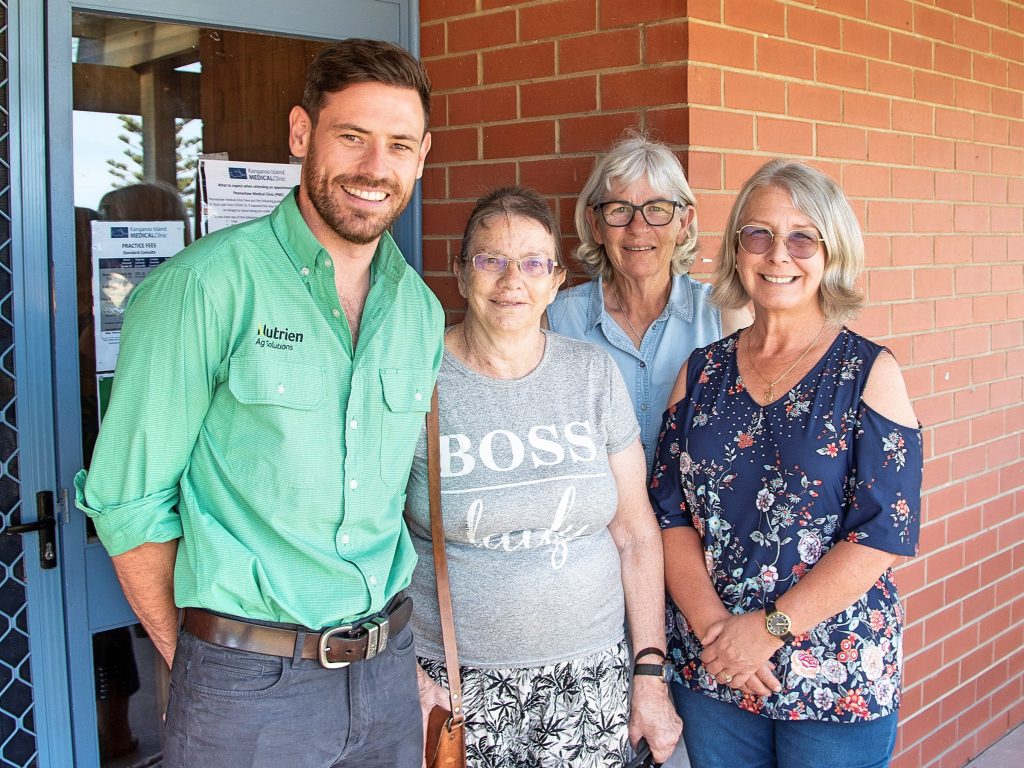
“Since the launch of the Community Grants program in 2021, Nutrien has supported 110 projects by awarding over $500,000 in grants to rural and regional communities across Australia,” said Mady Muirhead, Corporate Affairs Coordinator at Nutrien Ag Solutions.
“The success of agriculture and the well-being of regional Australia are inextricably linked. We’re proud to play a leading role in helping to build a safe and sustainable future for our farmers and their communities. We are going further by investing in meaningful projects and supporting local grassroot organisations.
“We have thousands of employees living and working in rural and regional Australia, ingrained in their local communities. They have a deep understanding of what makes a community thrive – and it’s all about the people.
“Last year we saw many parts of our country face environmental disasters on a significant scale, with many still facing recovery. This placed significant unanticipated stress on grassroots organisations and groups that work tirelessly to support their local communities. Nutrien Ag Solutions is so proud to provide a much-needed boost to the rural and regional communities we are a part of,” said Ms Muirhead.
The Community Grants Program has supported more than 100 local projects over the past two years, including the installation of an Indigenous artwork and Bush Tucker Garden at Childers, Queensland; contributing to a purpose-built beach ramp and wheelchairs at Swansea, Tasmania; child protection workshops at Dowerin, Western Australia and the installation of solar power panels at the Cambrai Sports Club in South Australia.
“We work in partnership with our communities to support them at a local level, in ways that best suit the individual needs of that community,” said Ms Muirhead.
“Rural communities continue to deal with so many challenges and the role of local not-for-profit groups is becoming ever more critical in filling gaps and helping create vibrant, sustainable communities. Many of these organisations have wonderful volunteers who do so much but projects to improve community facilities or resource new projects or operations also need funding,” said FRRR CEO, Natalie Egleton.
“Over the last two years local fundraising has been made increasingly difficult due to COVID and increasing economic pressures, meaning locals have less capacity to give. As a result, we’re seeing more and more demand for funding support.
“We are grateful for Nutrien’s ongoing partnership, as it enables grassroots groups to access grants that can go toward these projects. But it’s more than just money, as Nutrien’s support continues locally for groups that get funding, staying connected to the local branches as projects are implemented. So, we look forward to seeing what projects come forward this year,” Ms Egleton said.
Applications for the 2023 Nutrien Ag Solutions Community Grants Program are open now and close 10th August 2023, with successful applicants announced in October this year.
An online webinar will be held to support grant seekers from 12.30 – 1.30 (AEST) on Monday 24 July. Sign up for the webinar via the FRRR website or via this LINK.
For more information and to apply, visit: https://frrr.org.au/funding/place/nutrien/

